Week 04 - Theoretical Frameworks - What is behind the research that we complete
A presentation at Heritage University at CBC Week 04 in in Pasco, WA 99301, USA by Jacob Campbell

SOWK 459 Fall 2019 Planning: Class 04
Location: CBC Campus - Tuesday T-336 & SWL-220
Time: Tuesdays and Thursdays from 5:30-8:15
Week 04: 09/09/19 — 09/15/19
Reading Assignment: DeCarlo (2018) chapters six and seven
Topic and Content Area: Theoretical Frameworks
Assignments Due: Assignment 05: theoretical framework due Friday 09/13/19 at 11:55 PM via Moodle; Assignment 02: reading quiz for chapters six and seven are due at 5:30 PM prior to class via My Heritage
Other Important Information: N/A

Why Students don't finish their degrees: Interactive Activity Regarding Theories
Information taken from Julie Schillreff
[Small Group Activity] Divide students up into three groups where they will come up with an explination regarding some satistical information.
- Organize students into groups of three using grouping cards
- Explain to students that most students who begin their freshman year at Heritage don’t earn a degree
- Give students to come up with an explanation for why this is happening
- Encourage them to draw diagrams to illustrate their explanation

Agenda
- Perspectives and theories
- Writing your theoretical framework
- Styles of reasoning for research

Research and Theory: From Ontology to Sources
The various way that we talk and think about research follows a number of different areas of interest. This include:
- Ontology: What is reality?
- Epistemology: What and how can I know reality or knowledge?
- Theoretical perspective: What approach can we use to get knowledge?
- Methodology: What procedures can we use to acquire knowledge?
- Methods: What tools can we acquire knowledge?
- Sources: What data can we collect?

Paradigms: Definition
As we start to look into what theoretical perspective we will following, it is driven by our ontology epistemology. Both the ontology and epistemology are encompassed by what paradigm we choose to relate to our research.
We can start by defining what is a paradigm.
Paradigm: Set of assumptions that help you understand and view the world

Paradigms: Positivism Paradigm
There are four paradigms that we generally consider when we think about social work research. The paradigm that is most frequently thought of as we consider social work research is that of Positivism.
Positivism Paradigm: objectivity, deductive logic, empiricism, value-free science Assumptions: Society can and should be studied empirically and scientifically.

Substance Abuse Example: Positivism Paradigm
DeCarlo (2018) describes an example of positivism in research as:
An inquiry would look at “precisely measuring substance abuse and finding out the key causes of substance abuse during adolescence. Forgoing the objectivity of precisely measuring substance abuse”
[Whole Class Activity] Discuss what this looks like.
Photo Credit: Matthew T Rader

Paradigms: Social Constructionism
A second common paradigm is that of social consuctionism
Social Constructionism Paradigm: subjectivity, social context and interaction, meaning, understanding, inductive logic
Assumptions: Reality is created collectively. Social context and interaction frame our realities.

Substance Abuse Example: Social constructionism Paradigm
DeCarlo (2018) describes an example of social constructionism paradigm
“Focus on how people who abuse substances understand their lives and relationships with various drugs of abuse. In so doing, it seeks out the subjective truth of each participant in the study”
Photo Credit: Matthew T Rader

Paradigms: Critical Paradigm
A third paradigm is that of Critical Paradigm.
Critical Paradigm: Power, inequality, social change. Values-based, social justice and oppression
Assumptions: Social science can never be truly value-free and should be conducted with the express goal of social change in mind.

Substance Abuse Example: Critical Paradigm
DeCarlo (2018) describes an example of critical paradigm.
“Investigate how people who have substance abuse problems are an oppressed group in society and seek to liberate them from external sources of oppression, like punitive drug laws, and internal sources of oppression, like internalized fear and shame”
Photo Credit: Matthew T Rader

Paradigms: Postmodern Paradigm
The final, and most complicated paradigm is that of Postmodern
Postmodern Paradigm: No truth. Skepticism towards large, sweeping theories Assumptions: Social science can never be truly value-free and should be conducted with the express goal of social change in mind.

Substance Abuse Example: Postmodern Paradigm
DeCarlo (2018) describes an example of postmodern paradigm
“Study one person’s self-reported journey into substance abuse and changes that occurred in their self-perception that accompanied their transition from recreational to problematic drug use”
Photo Credit: Matthew T Rader

Paradigms: Understanding Check
So we’ve talked breifly about the various paradigms that are out there. Look at this statement, and try to think below what is going on with the statement (e.g., what are the assumptions made) and what is wrong with this statement.
“When a scientist observes the world, he does so objectively.”
[Small Group Activity] Talk with a partner about what kind of problems you might see with the statement.
[Whole Class Activity] Follow up with class. Attempt to draw out the following potential problems:
- Gender
- Use of prior experiences—impossible to step outside of world
- Ignores the sociology of science
- Subject does not have any agency
- Who gets to be a scientist?

Theory: An Overall Explanation of Why Something Occurs
So if paradigms are a broad way of viewing and thinking about the world, a theory is the explanation of the world that is based in a specific paradigm.
A logically interrelated set of propositions that helps us explain, predict, and understand why things happen

Why Theory
These Theories help us explain what is going on in the world, but why are the so important.
- Theory helps us understand why and how things occur.
- Theory helps us predict what may occur.
- Theory guides our research and literature review.
- Theory helps us understand where the most effective intervention should take place.

Social Work Theories: Discussed in DeCarlo's Text
The following are some social work theories that are discussed in DeCarlo’s (2018) text. It is not a comprehensive list, but we will provide some examples of each:
Theory | Focuses on —- | —- Systems Theory | Interrelations between parts of society; how parts work together Conflict theory | Who wins and who loses based on the way that society is organized Symbolic interactionism | How meaning is created and negotiated though interactions Social Exchange | How behavior is influenced by costs and rewards

Substance Abuse Example: Systems Theory
A researcher using systems theory might look at the following research example as described by DeCarlo (2018).
“How a lack of employment opportunities might impact rates of substance abuse in an area”
Photo Credit: Matthew T Rader

Substance Abuse Example: Conflict Theory
A researcher using conflict theory might look at the following research example as described by DeCarlo (2018).
“How the War on Drugs has impacted minority communities”
Photo Credit: Matthew T Rader
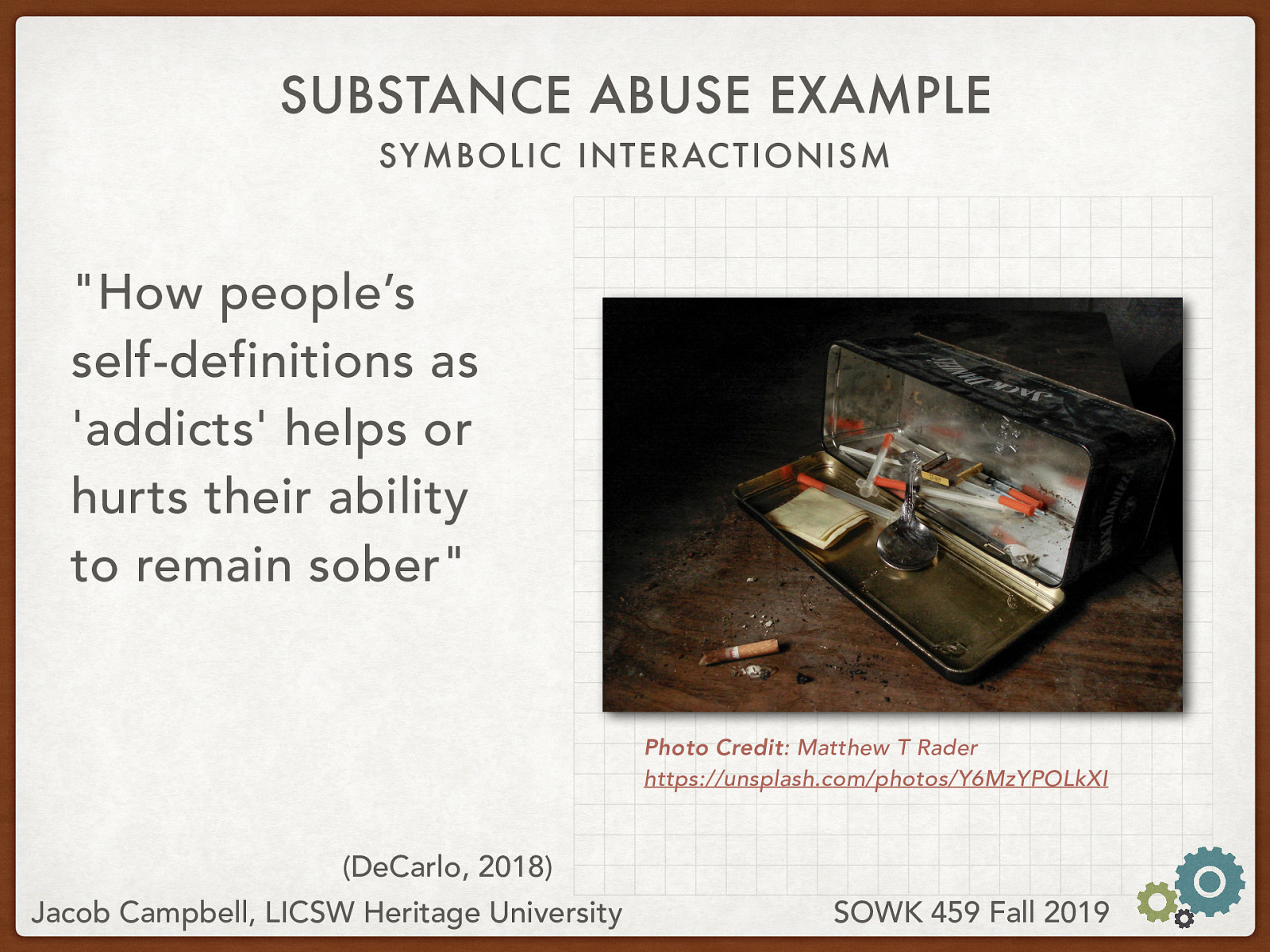
Substance Abuse Example: Social Interactionism
A researcher using social interactionism might look at the following research example as described by DeCarlo (2018).
“How people’s self-definitions as ‘addicts’ helps or hurts their ability to remain sober”
Photo Credit: Matthew T Rader
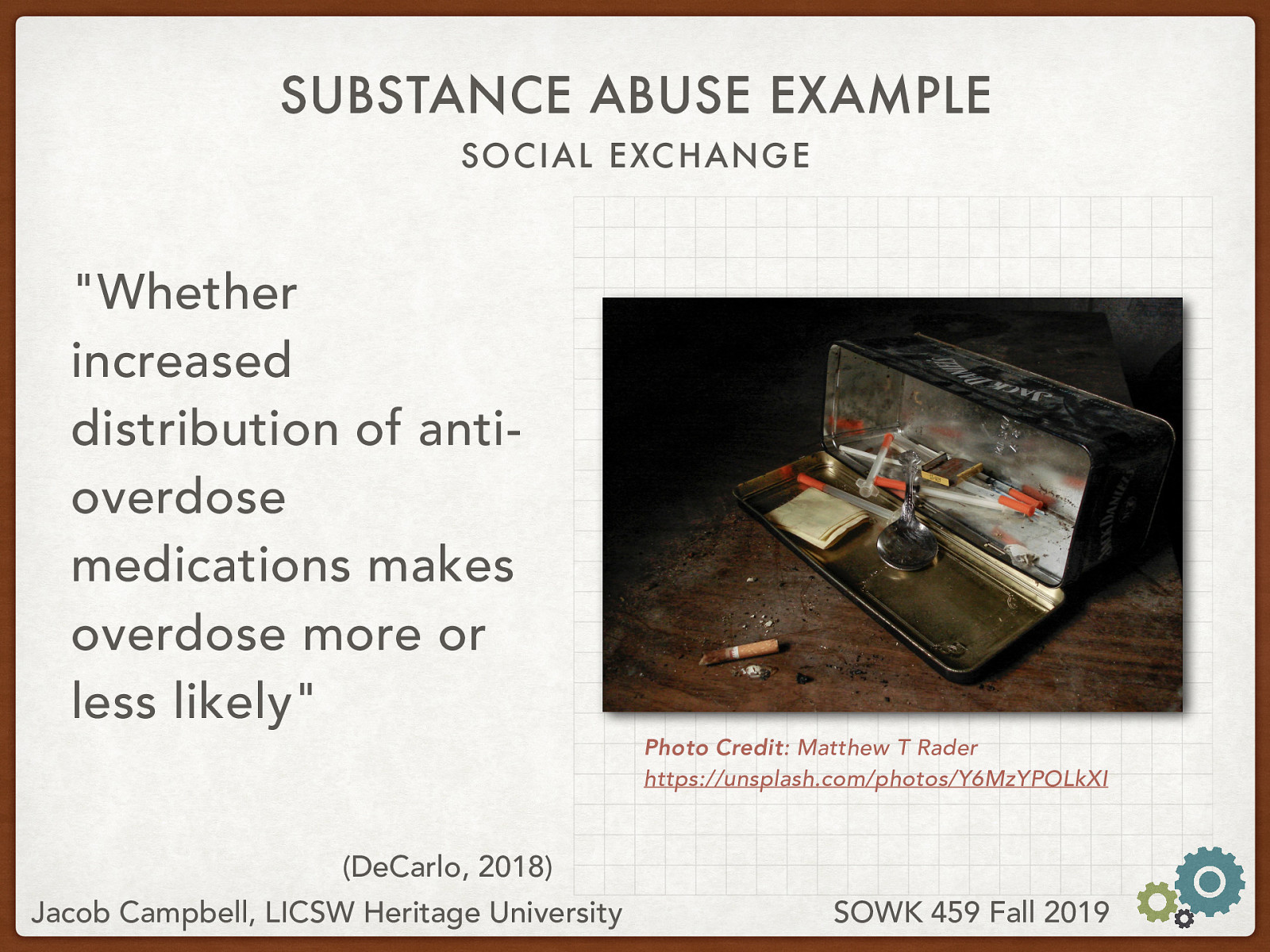
Substance Abuse Example: Social Exchange
A researcher social exchange theory might look at the following research example as described by DeCarlo (2018).
“Whether increased distribution of anti-overdose medications makes overdose more or less likely”
Photo Credit: Matthew T Rader

Theories in Social Work: Selection of Some of the Major Theories
The following is a bit more of a comprehensive list. Potentially won’t review all of them, but offer it as a resource. You can also look at the original document by Setterlund (2013).
- Systems Theory
- Behaviorism & Social Learning Theory
- Psychodynamic Theory
- Psychosocial Developmental Theory
- Transpersonal Theory
- Social Exchange Theory
- Social Constructionism
- Symbolic Interactionism
- Conflict Theory
- Contingency Theory
For each theory Setterlund has compiled: the following information
Theory Name: Underlying Perspective: Theories Included: Focus of the Theory: Main Components in Human Behavior: Theorists: Practice Interventions: Practice Applications:
Setterlund, K (2013) Overview of theories of human behavior and the social envionrment. Retrieved from https://home.apu.edu/~ksetterlund/2012-2013/theories%20handout%20with%20terminology.pdf
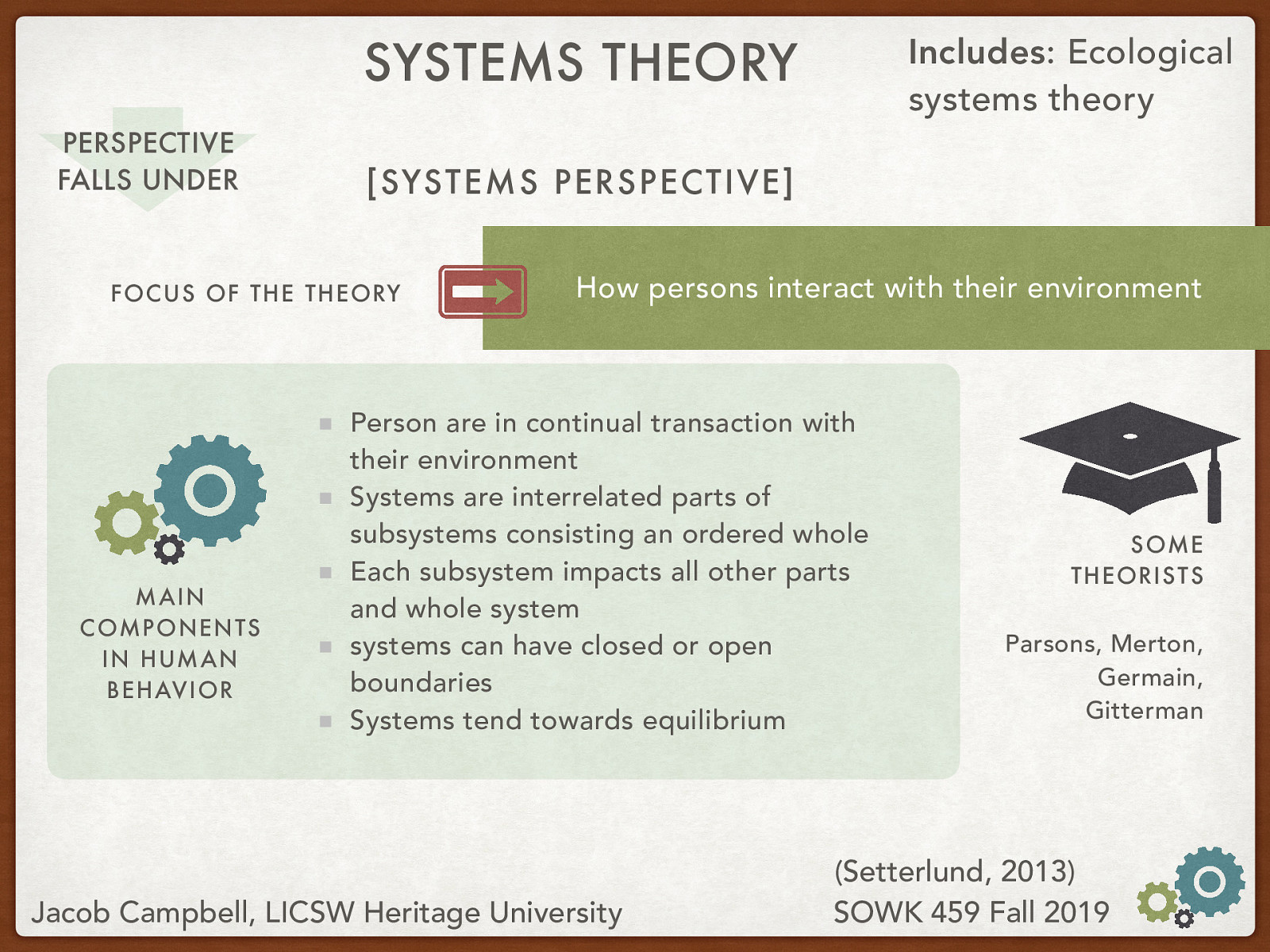
Systems Theory (1 of 4)
Theory Name: Systems Theory Underlying Perspective: Systems Perspective Theories Included: Ecological systems theory Focus of the Theory: How persons interact with their environment Main Components in Human Behavior:
- Person are in continual transaction with their environment
- Systems are interrelated parts of subsystems consisting an ordered whole
- Each subsystem impacts all other parts and whole system
- systems can have closed or open boundaries
- Systems tend towards equilibrium
Theorists: Parsons, Merton, Germain, Gitterman
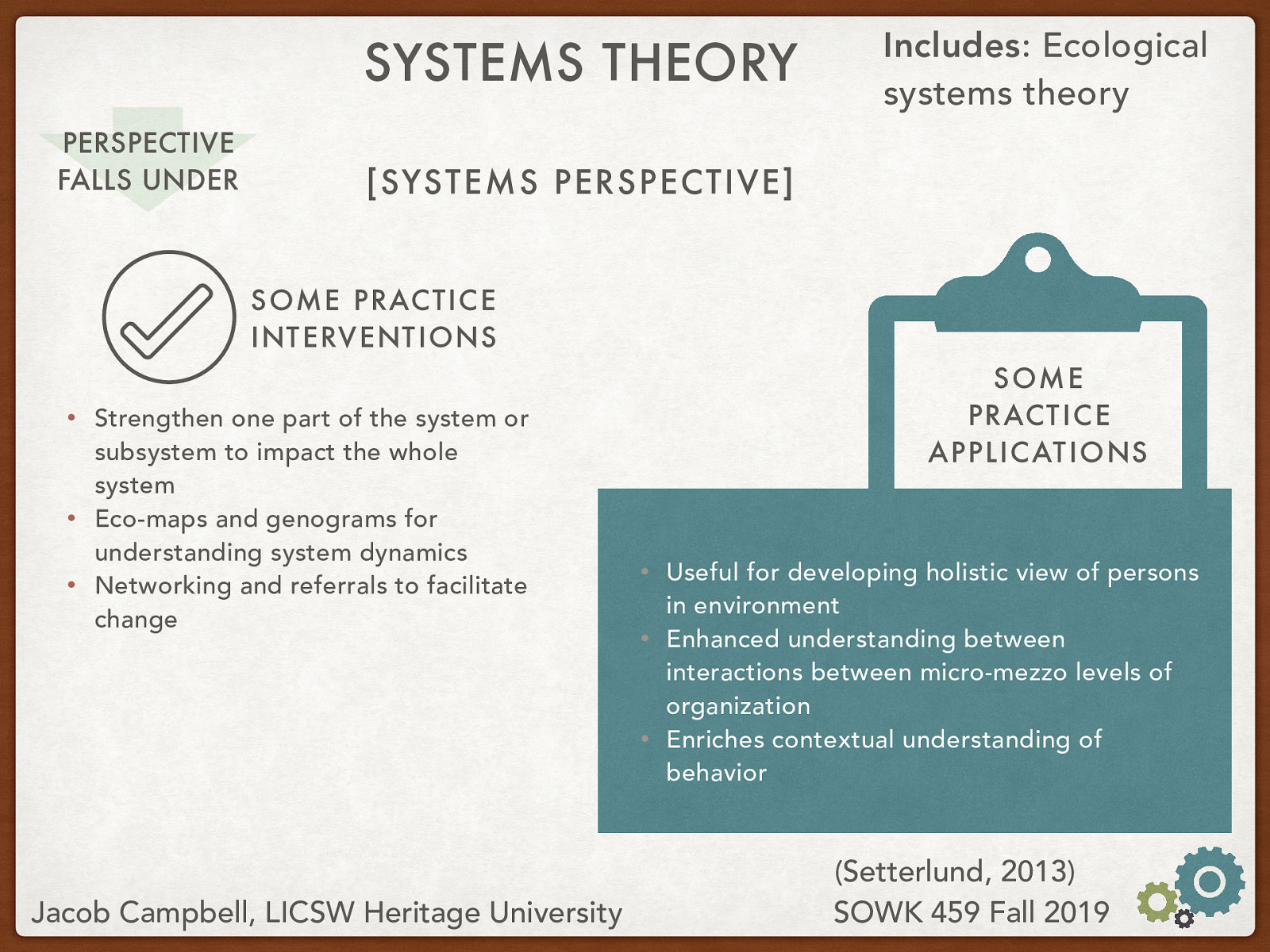
Systems Theory (2 of 4)
Practice Interventions:
- Strengthen one part of the system or subsystem to impact the whole system
- Eco-maps and genograms for understanding system dynamics
- Networking and referrals to facilitate change
Practice Applications:
- Useful for developing holistic view of persons in environment
- Enhanced understanding between interactions between micro-mezzo levels of organization
- Enriches contextual understanding of behavior
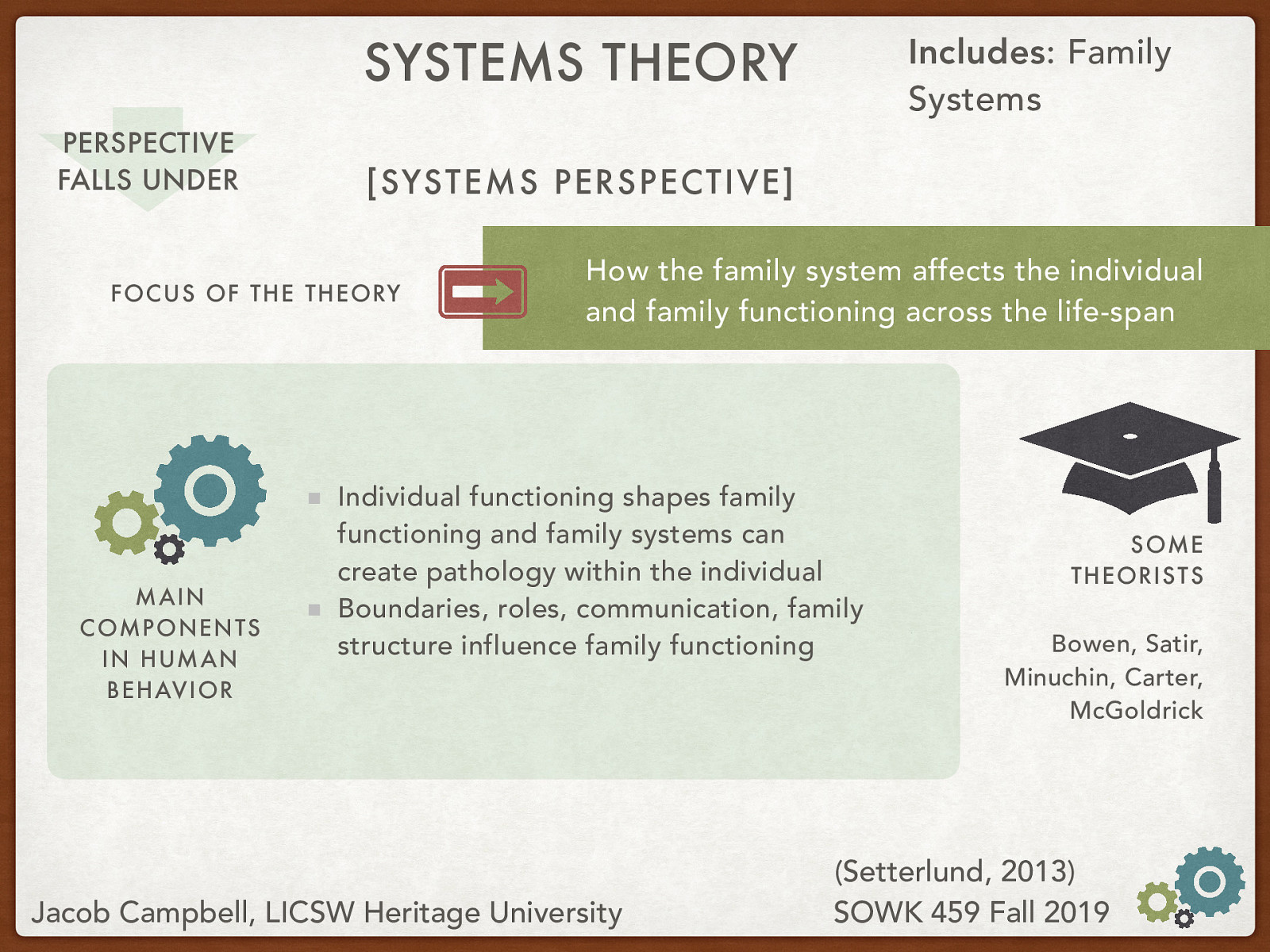
Systems Theory - Families (3 of 4)
Theory Name: Systems Theory Underlying Perspective: Systems Perspective Theories Included: Family Systems Focus of the Theory: How the family system affects the individual and family functioning across the life-span Main Components in Human Behavior:
- Individual functioning shapes family functioning and family systems can create pathology within the individual
- Boundaries, roles, communication, family structure influence family functioning
Theorists: Bowen, Satir, Minuchin, Carter, McGoldrick
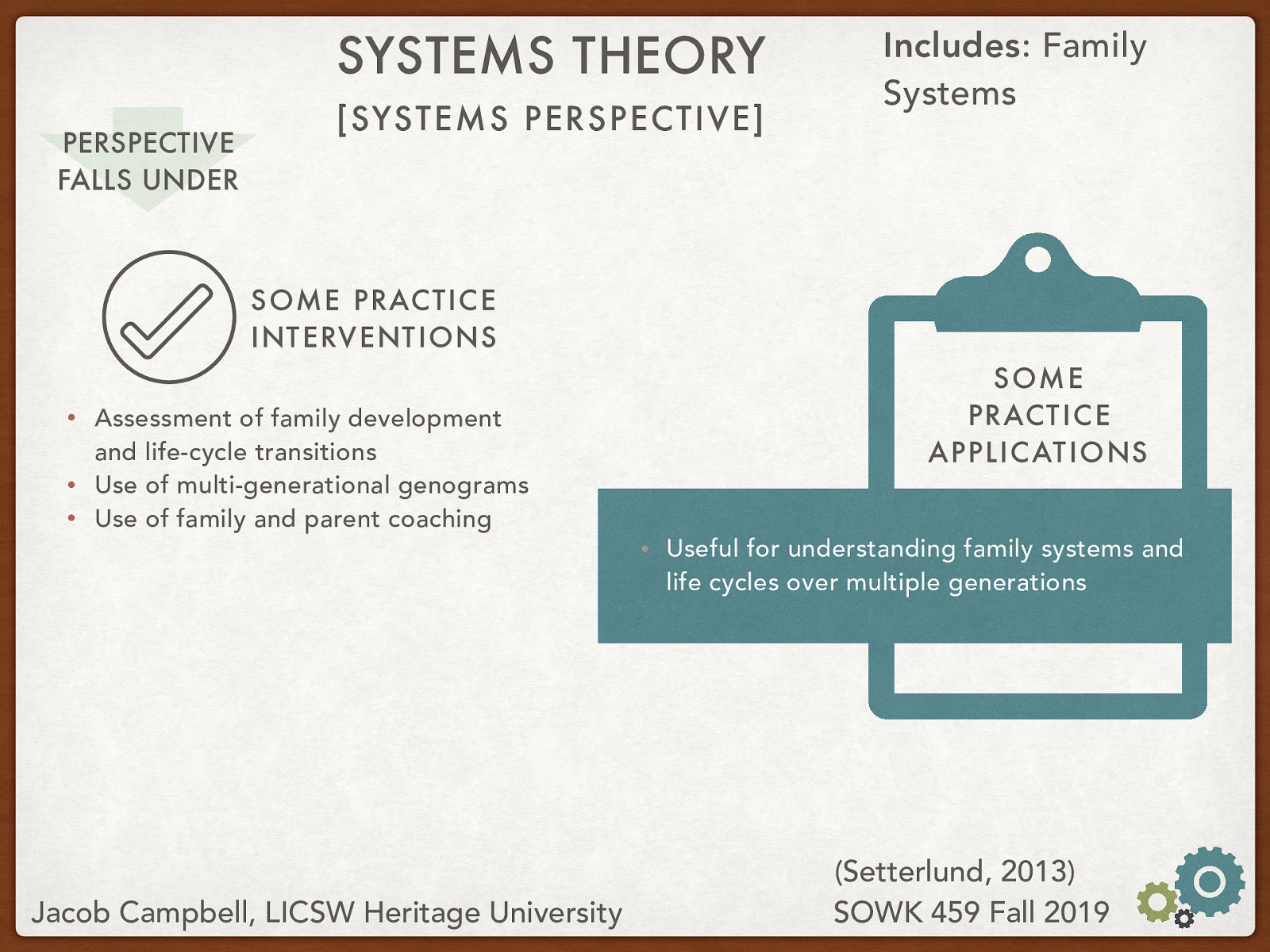
Systems Theory - Families (4 of 4)
Practice Interventions:
- Assessment of family development and life-cycle transitions
- Use of multi-generational genograms
- Use of family and parent coaching
Practice Applications: Useful for understanding family systems and life cycles over multiple generations
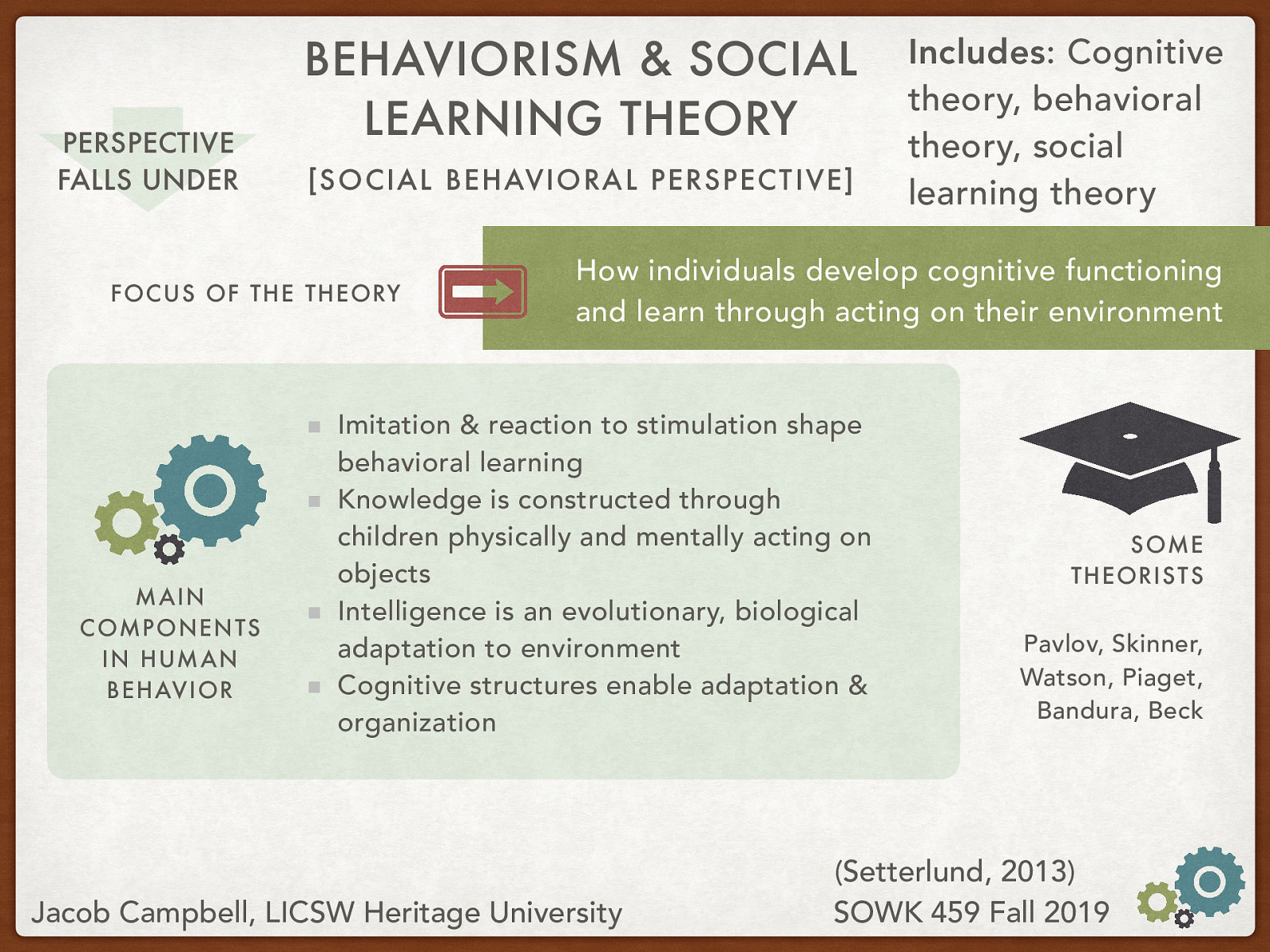
Behaviorism & Social Learning Theory (1 of 2)
Theory Name: Behaviorism & Social Learning Theory Underlying Perspective: [Social Behavioral Perspective] Theories Included: Cognitive theory, behavioral theory, social learning theory Focus of the Theory: How individuals develop cognitive functioning and learn through acting on their environment Main Components in Human Behavior:
- Imitation & reaction to stimulation shape behavioral learning
- Knowledge is constructed through children physically and mentally acting on objects
- Intelligence is an evolutionary, biological adaptation to environment
- Cognitive structures enable adaptation & organization
Theorists: Pavlov, Skinner, Watson, Piaget, Bandura, Beck
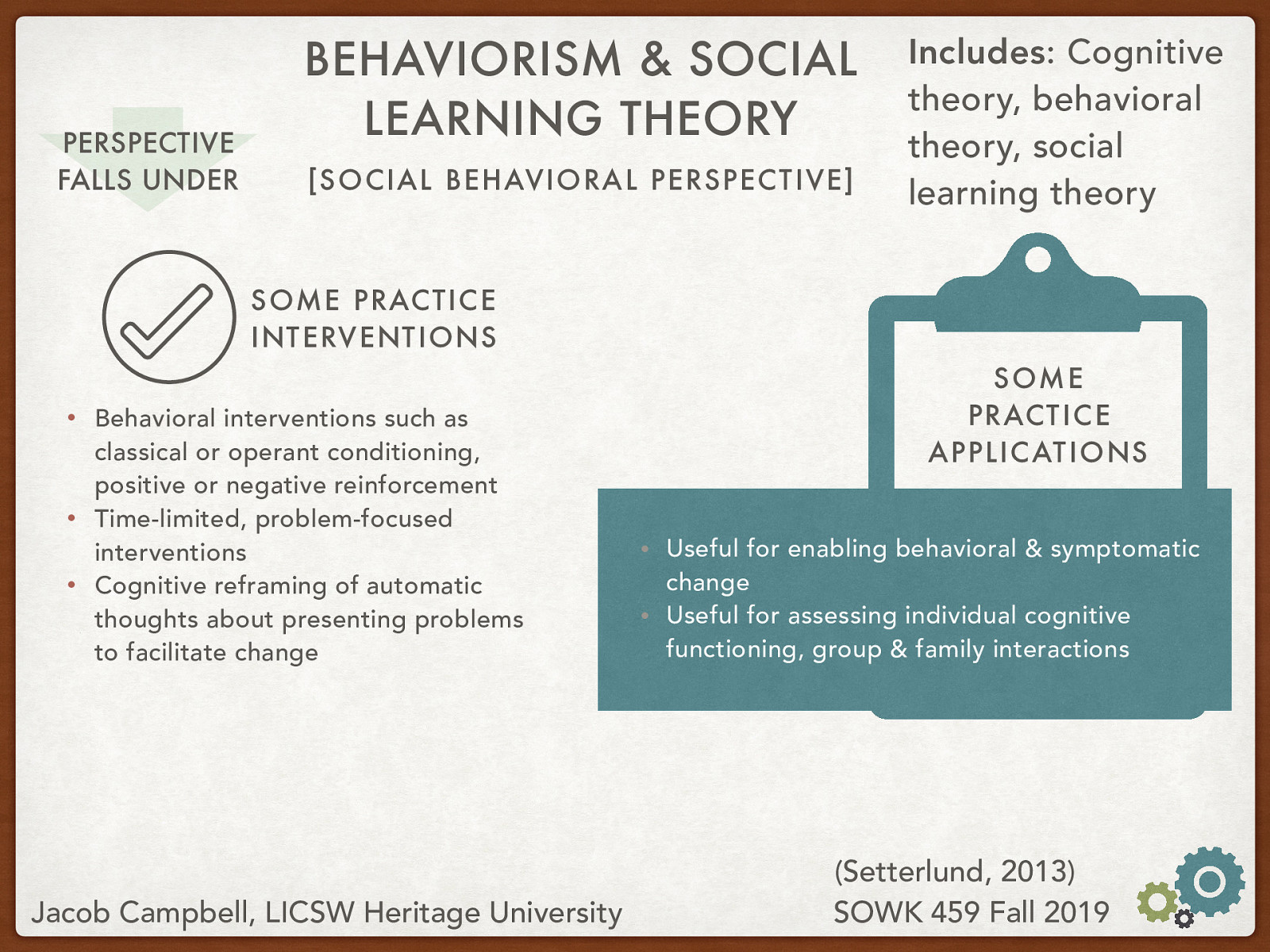
Behaviorism & Social Learning Theory (2 of 2)
Practice Interventions:
- Behavioral interventions such as classical or operant conditioning, positive or negative reinforcement
- Time-limited, problem-focused interventions
- Cognitive reframing of automatic thoughts about presenting problems to facilitate change
Practice Applications:
- Useful for enabling behavioral & symptomatic change
- Useful for assessing individual cognitive functioning, group & family interactions
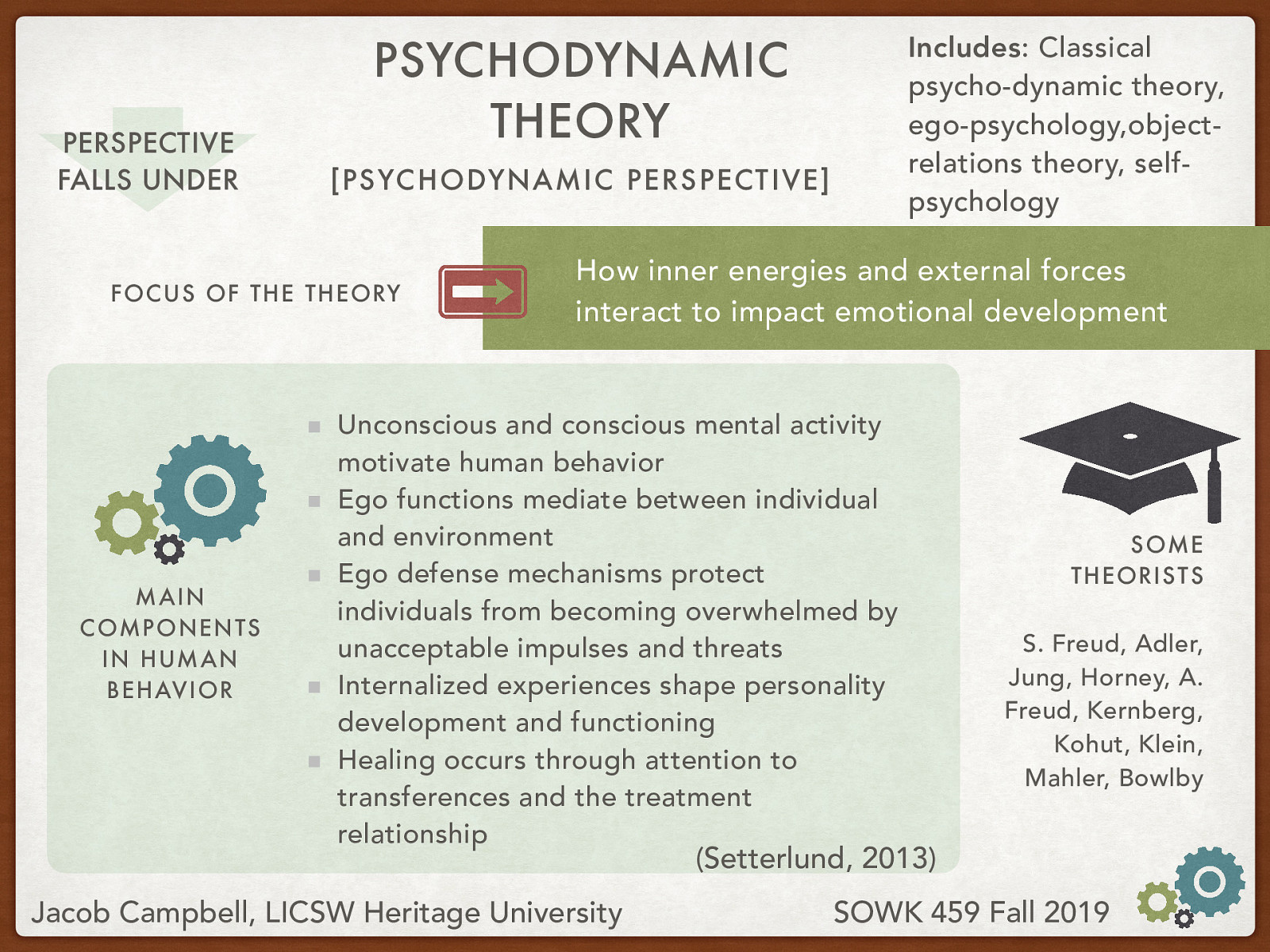
Psychodynamic Theory (1 of 2)
Theory Name: Psychodynamic Theory Underlying Perspective: [Psychodynamic Perspective] Theories Included: Classical psycho-dynamic theory, ego-psychology,object-relations theory, self-psychology Focus of the Theory: How inner energies and external forces interact to impact emotional development Main Components in Human Behavior:
- Unconscious and conscious mental activity motivate human behavior
- Ego functions mediate between individual and environment
- Ego defense mechanisms protect individuals from becoming overwhelmed by unacceptable impulses and threats
- Internalized experiences shape personality development and functioning
- Healing occurs through attention to transferences and the treatment relationship
Theorists: S. Freud, Adler, Jung, Horney, A. Freud, Kernberg, Kohut, Klein, Mahler, Bowlby
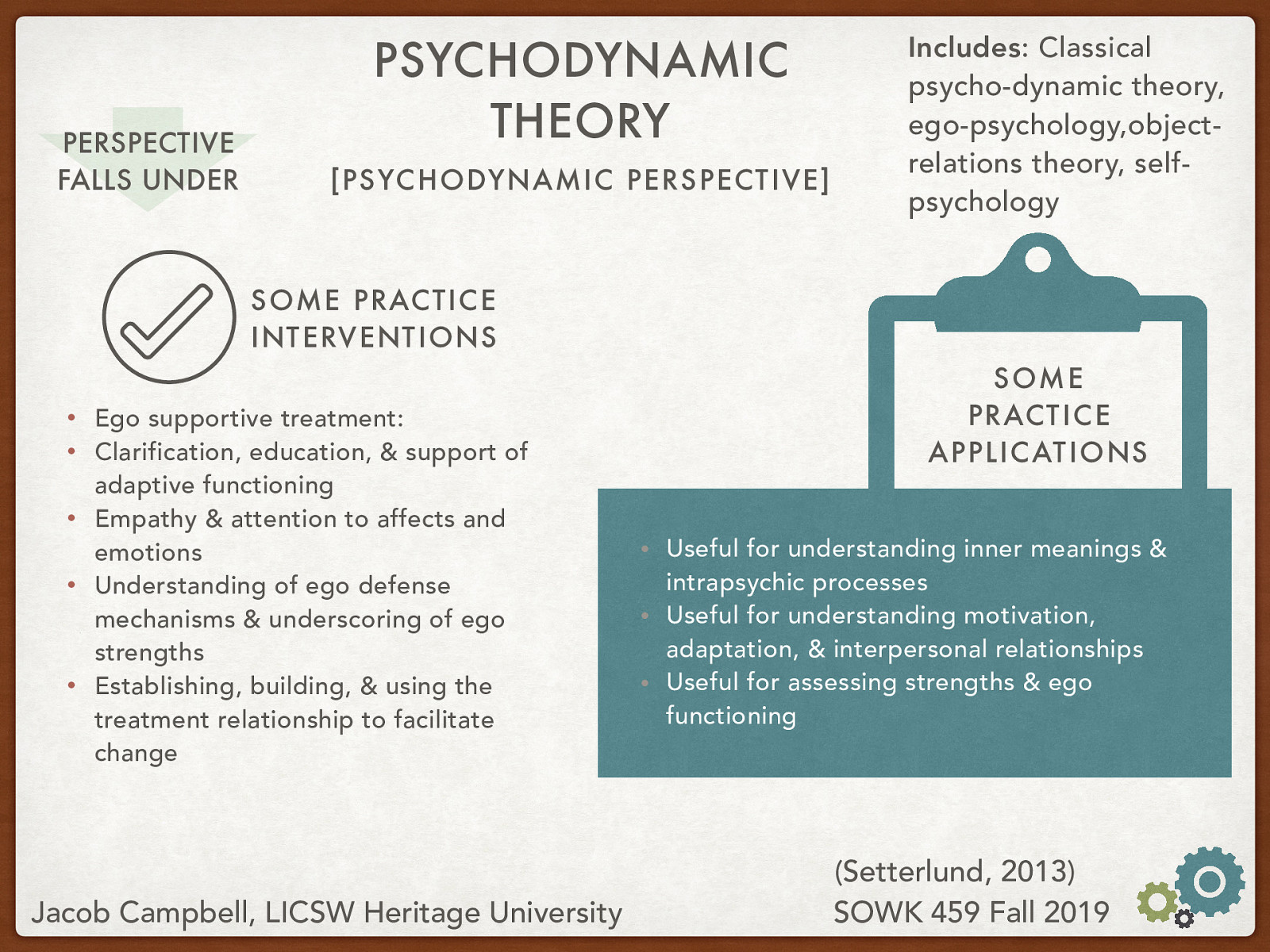
Psychodynamic Theory (2 of 2)
Practice Interventions:
- Ego supportive treatment:
- Clarification, education, & support of adaptive functioning
- Empathy & attention to affects and emotions
- Understanding of ego defense mechanisms & underscoring of ego strengths
- Establishing, building, & using the treatment relationship to facilitate change
Practice Applications:
- Useful for understanding inner meanings & intrapsychic processes
- Useful for understanding motivation, adaptation, & interpersonal relationships
- Useful for assessing strengths & ego functioning
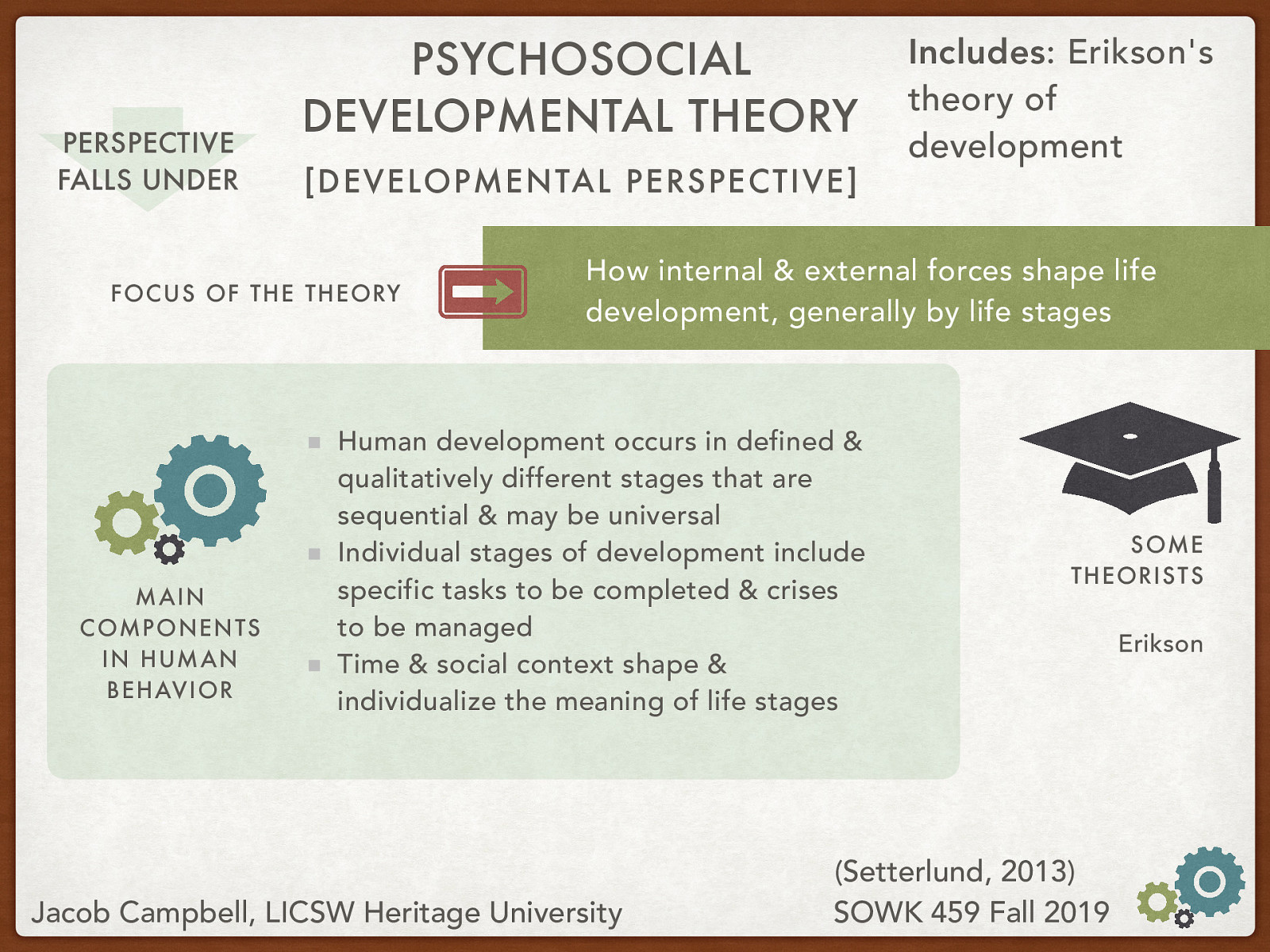
Psychosocial Developmental Theory (1 of 2)
Theory Name: Psychosocial Developmental Theory Underlying Perspective: [Developmental Perspective] Theories Included: Erikson’s theory of development Focus of the Theory: How internal & external forces shape life development, generally by life stages Main Components in Human Behavior:
- Human development occurs in defined & qualitatively different stages that are sequential & may be universal
- Individual stages of development include specific tasks to be completed & crises to be managed
- Time & social context shape & individualize the meaning of life stages
Theorists: Erikson
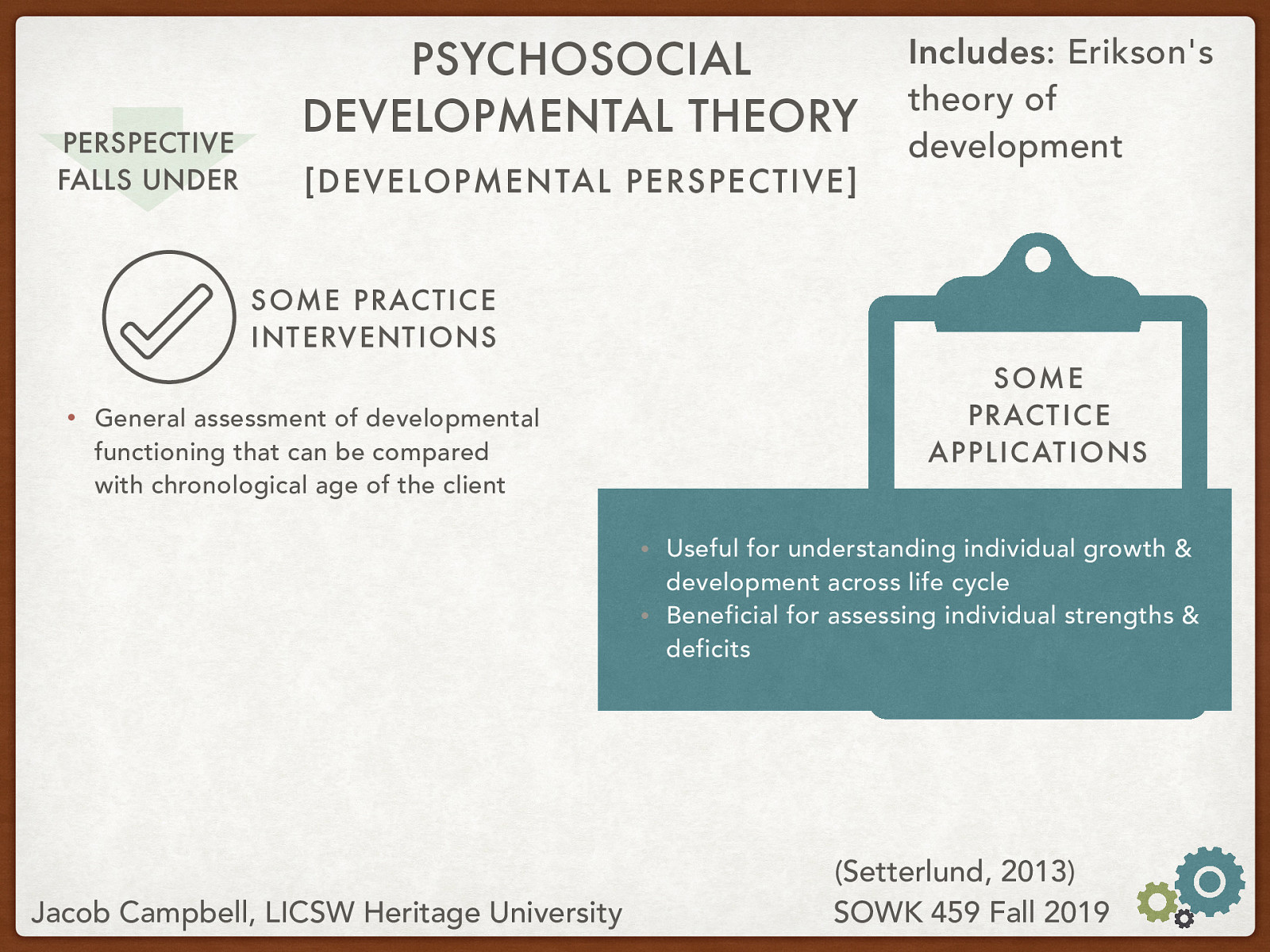
Psychosocial Developmental Theory (2 of 2)
Practice Interventions: General assessment of developmental functioning that can be compared with chronological age of the client
Practice Applications:
- Useful for understanding individual growth & development across life cycle
- Beneficial for assessing individual strengths & deficits
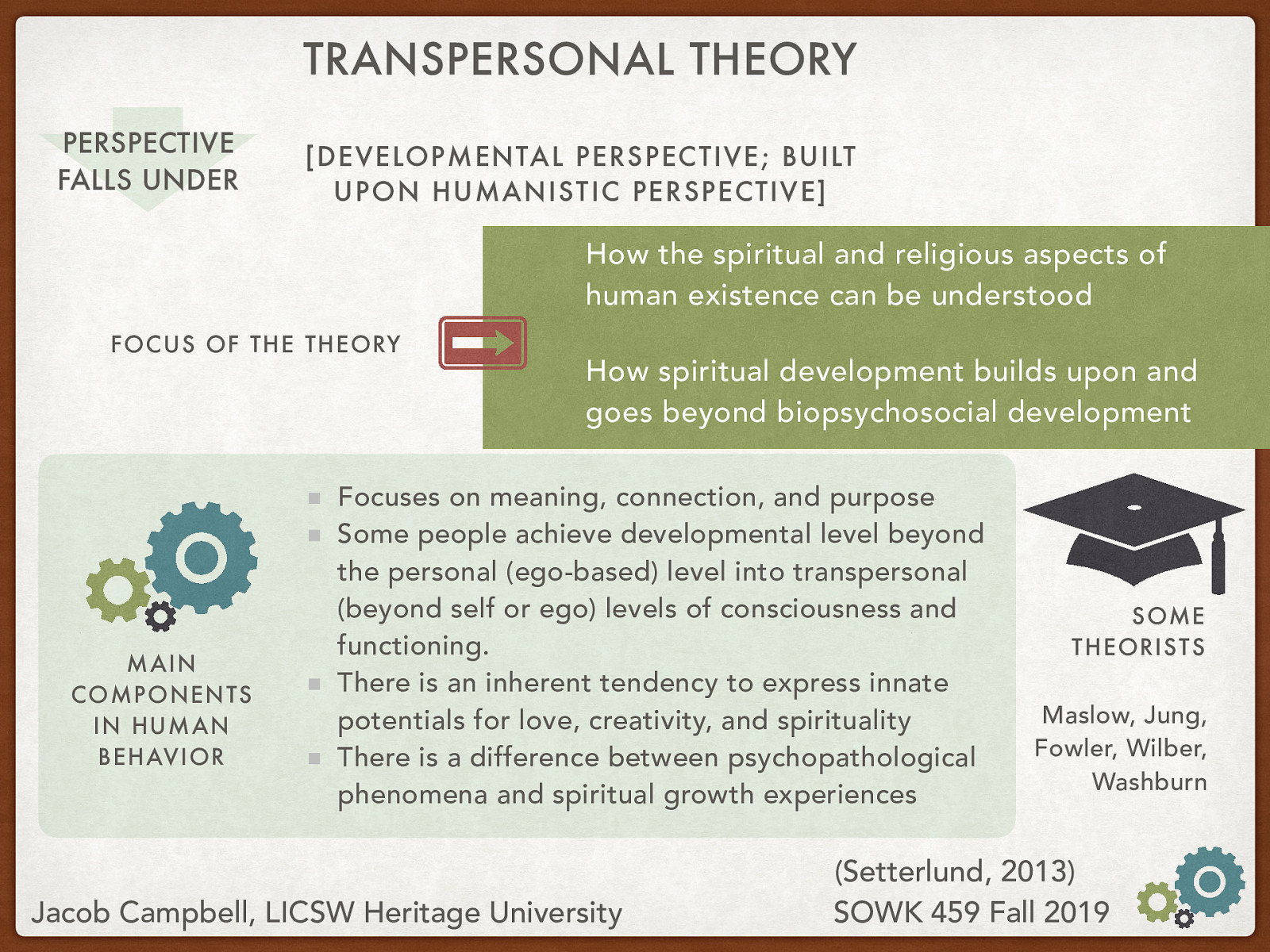
Transpersonal Theory (1 of 2)
Theory Name: Transpersonal Theory Underlying Perspective: [Developmental Perspective; built upon Humanistic Perspective] Focus of the Theory: How the spiritual and religious aspects of human existence can be understood; How spiritual development builds upon and goes beyond biopsychosocial development Main Components in Human Behavior:
- Focuses on meaning, connection, and purpose
- Some people achieve developmental level beyond the personal (ego-based) level into transpersonal (beyond self or ego) levels of consciousness and functioning.
- There is an inherent tendency to express innate potentials for love, creativity, and spirituality
- There is a difference between psychopathological phenomena and spiritual growth experiences
Theorists: Maslow, Jung, Fowler, Wilber, Washburn
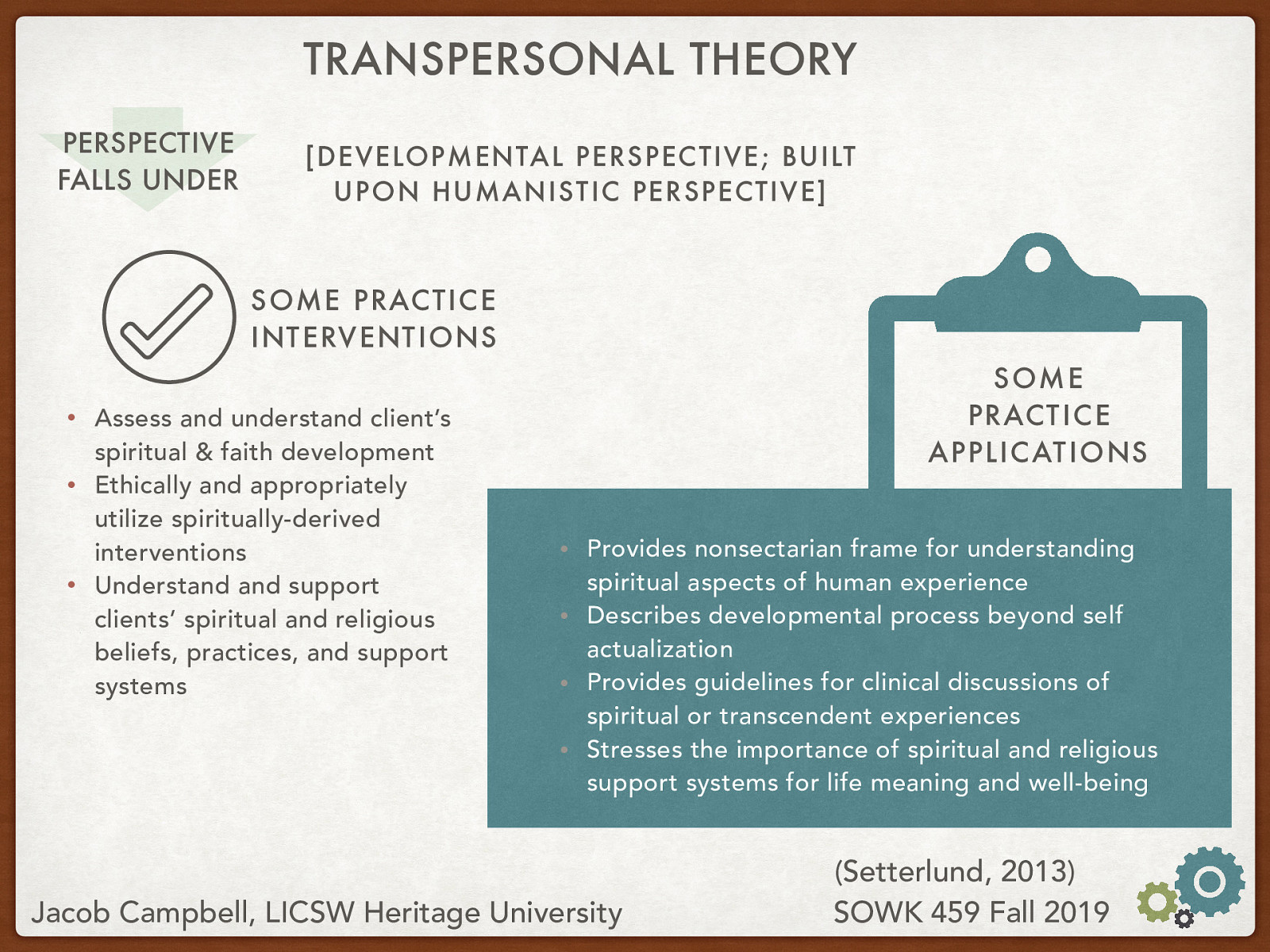
Transpersonal Theory (2 of 2)
Practice Interventions:
- Assess and understand client’s spiritual & faith development
- Ethically and appropriately utilize spiritually-derived interventions
- Understand and support clients’ spiritual and religious beliefs, practices, and support systems
Practice Applications:
- Provides nonsectarian frame for understanding spiritual aspects of human experience
- Describes developmental process beyond self actualization
- Provides guidelines for clinical discussions of spiritual or transcendent experiences
- Stresses the importance of spiritual and religious support systems for life meaning and well-being
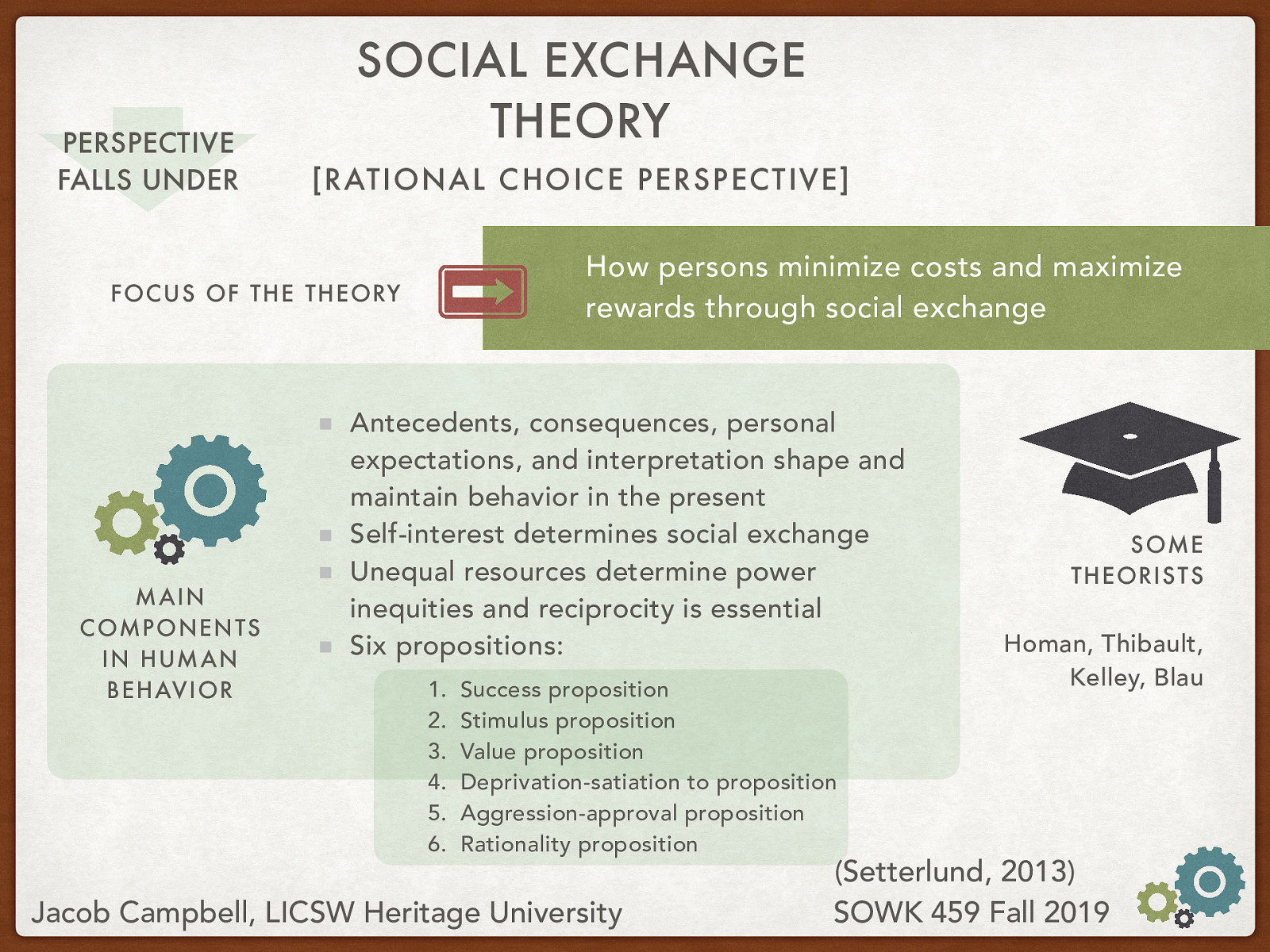
Social Exchange Theory (1 of 2)
Theory Name: Social Exchange Theory Underlying Perspective: [Rational Choice Perspective] Focus of the Theory: How persons minimize costs and maximize rewards through social exchange Main Components in Human Behavior:
- Antecedents, consequences, personal expectations, and interpretation shape and maintain behavior in the present
- Self-interest determines social exchange
- Unequal resources determine power inequities and reciprocity is essential
- Six propositions:
- Success proposition
- Stimulus proposition
- Value proposition
- Deprivation-satiation to proposition
- Aggression-approval proposition
- Rationality proposition
Theorists: Homan, Thibault, Kelley, Blau
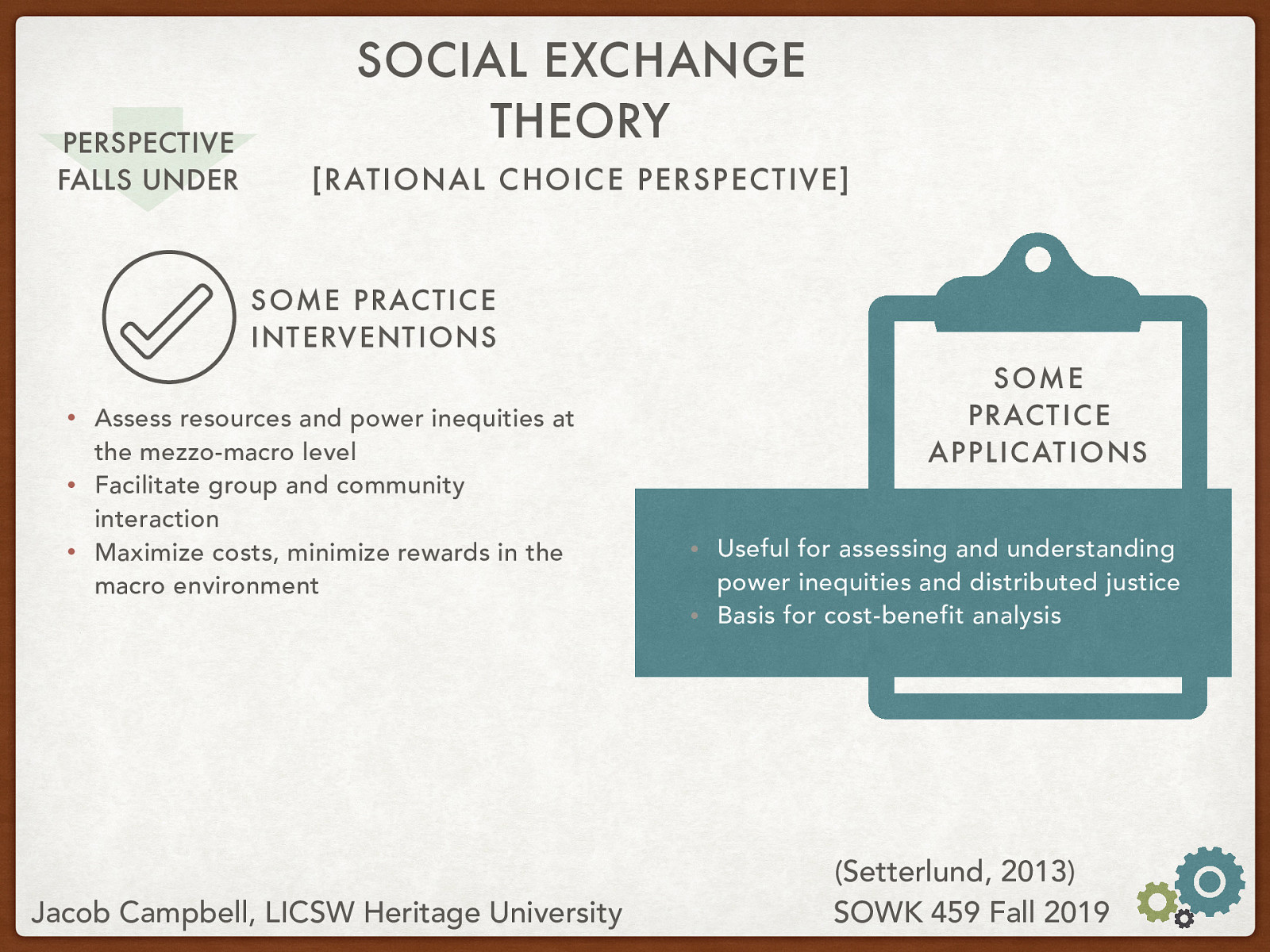
Social Exchange Theory (2 of 2)
Practice Interventions:
- Assess resources and power inequities at the mezzo-macro level
- Facilitate group and community interaction
- Maximize costs, minimize rewards in the macro environment
Practice Applications:
- Useful for assessing and understanding power inequities and distributed justice
- Basis for cost-benefit analysis
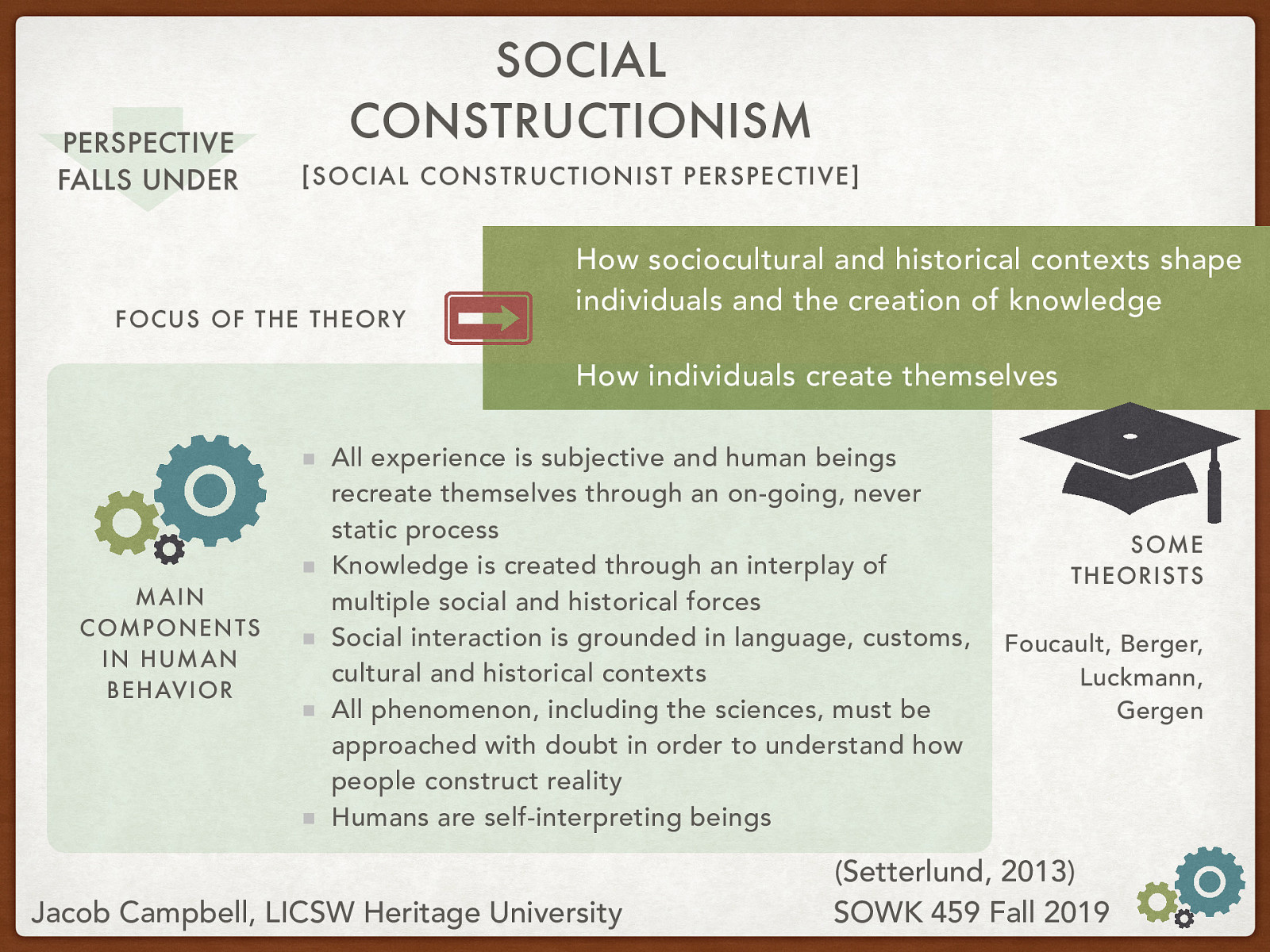
Social Constructionism (1 of 2)
Theory Name: Social Constructionism Underlying Perspective: [Social Constructionist Perspective] Focus of the Theory: How sociocultural and historical contexts shape individuals and the creation of knowledge; How individuals create themselves . Main Components in Human Behavior:
- All experience is subjective and human beings recreate themselves through an on-going, never static process
- Knowledge is created through an interplay of multiple social and historical forces
- Social interaction is grounded in language, customs, cultural and historical contexts
- All phenomenon, including the sciences, must be approached with doubt in order to understand how people construct reality
- Humans are self-interpreting beings
Theorists: Foucault, Berger, Luckmann, Gergen
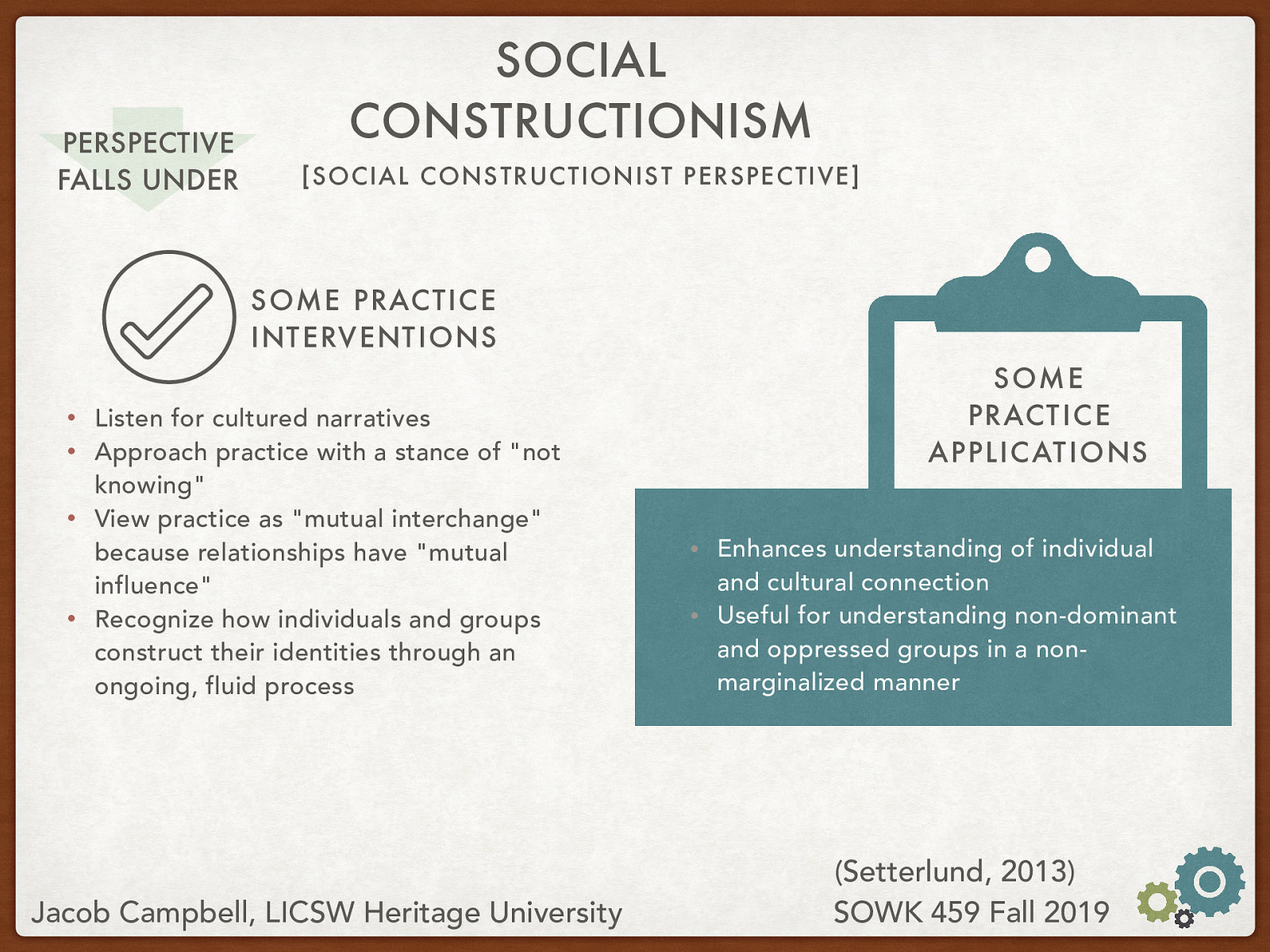
Social Constructionism (2 of 2)
Practice Interventions:
- Listen for cultured narratives
- Approach practice with a stance of “not knowing”
- View practice as “mutual interchange” because relationships have “mutual influence”
- Recognize how individuals and groups construct their identities through an ongoing, fluid process
Practice Applications:
- Enhances understanding of individual and cultural connection
- Useful for understanding non-dominant and oppressed groups in a non-marginalized manner
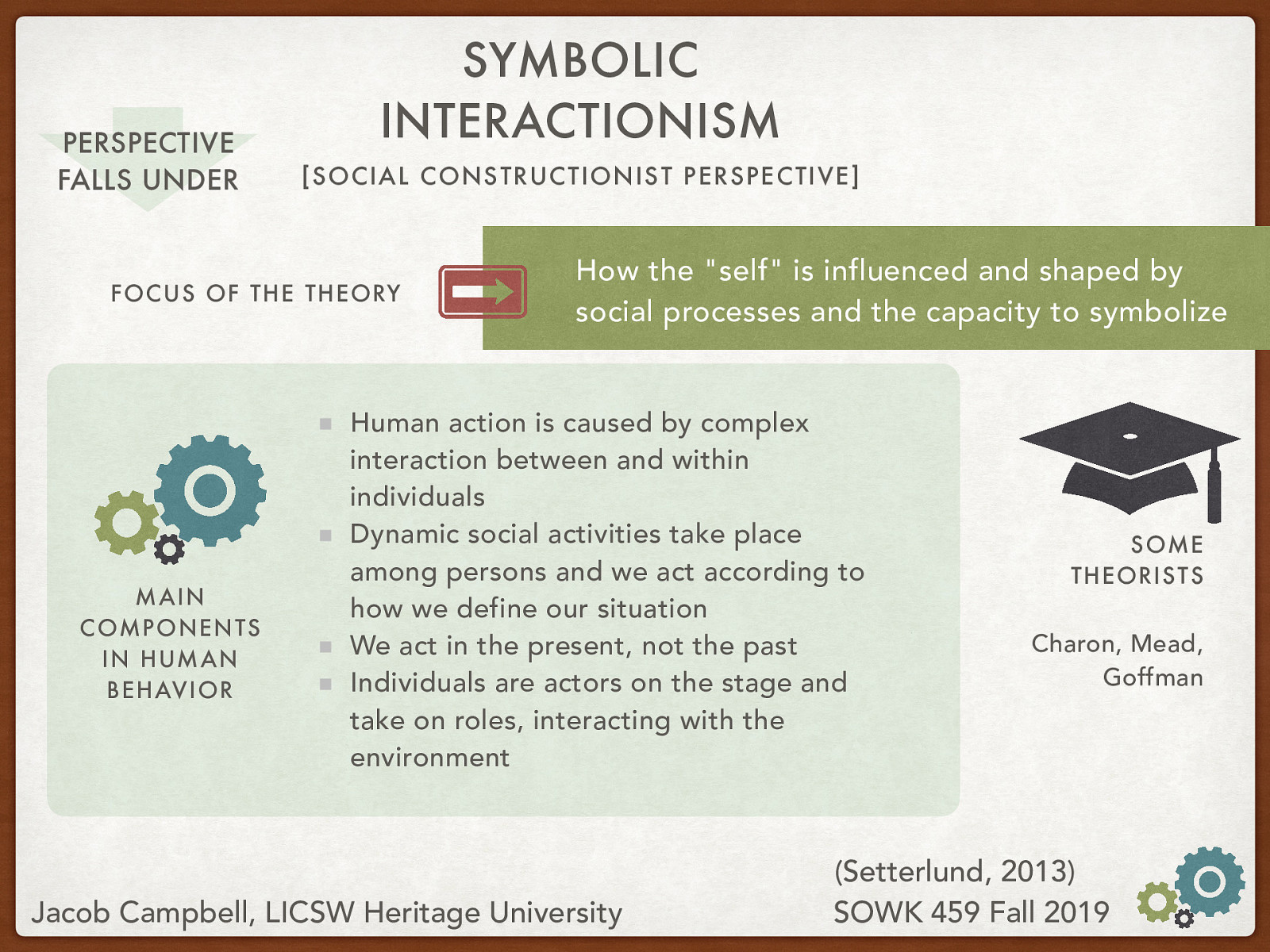
Symbolic Interactionism (1 of 2)
Theory Name: Symbolic Interactionism Underlying Perspective: [Social Constructionist Perspective] Focus of the Theory: How the “self” is influenced and shaped by social processes and the capacity to symbolize Main Components in Human Behavior:
- Human action is caused by complex interaction between and within individuals
- Dynamic social activities take place among persons and we act according to how we define our situation
- We act in the present, not the past
- Individuals are actors on the stage and take on roles, interacting with the environment
Theorists: Charon, Mead, Goffman
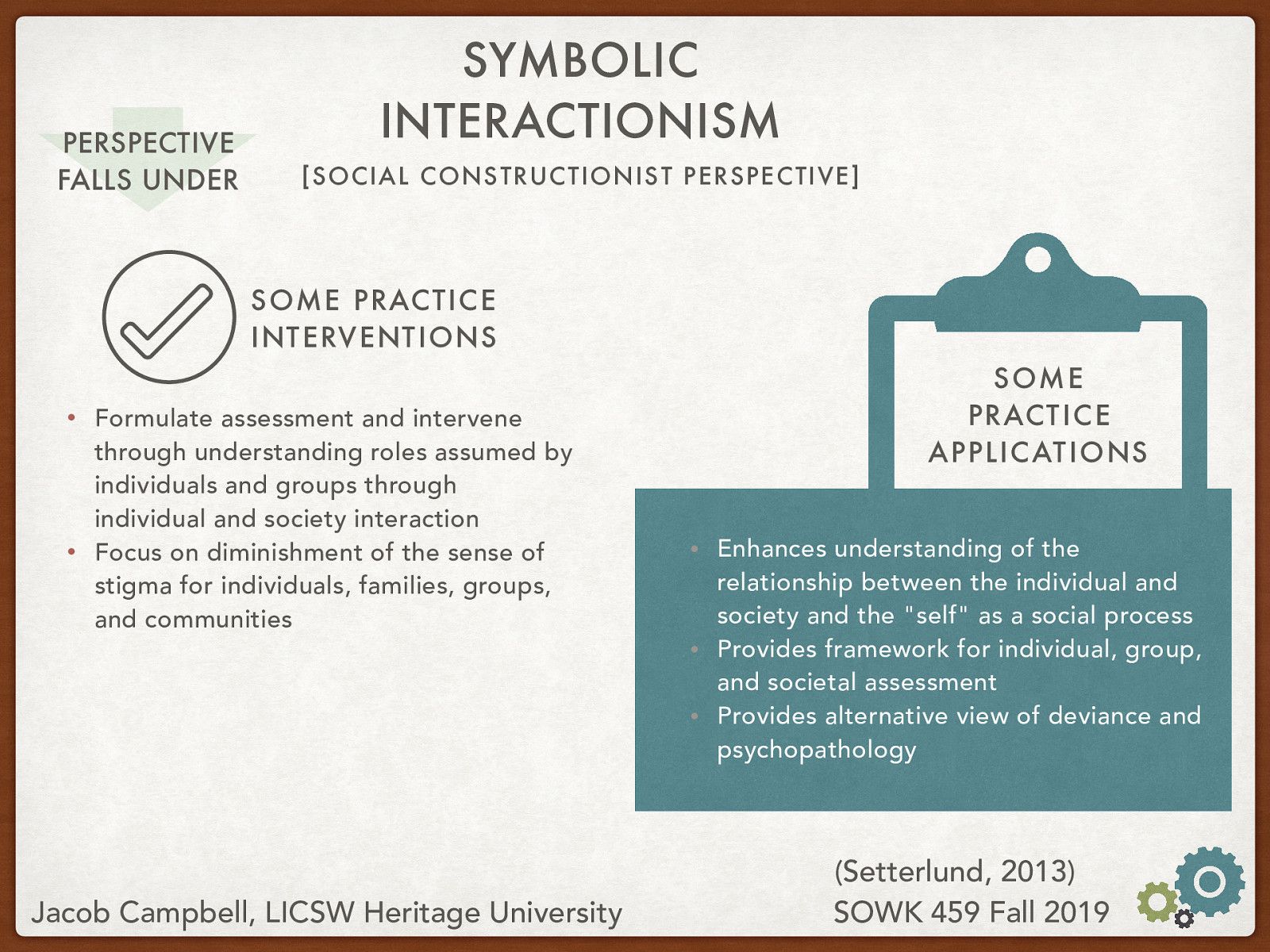
Symbolic Interactionism (2 of 2)
Practice Interventions:
- Formulate assessment and intervene through understanding roles assumed by individuals and groups through individual and society interaction
- Focus on diminishment of the sense of stigma for individuals, families, groups, and communities
Practice Applications:
- Enhances understanding of the relationship between the individual and society and the “self” as a social process
- Provides framework for individual, group, and societal assessment
- Provides alternative view of deviance and psychopathology
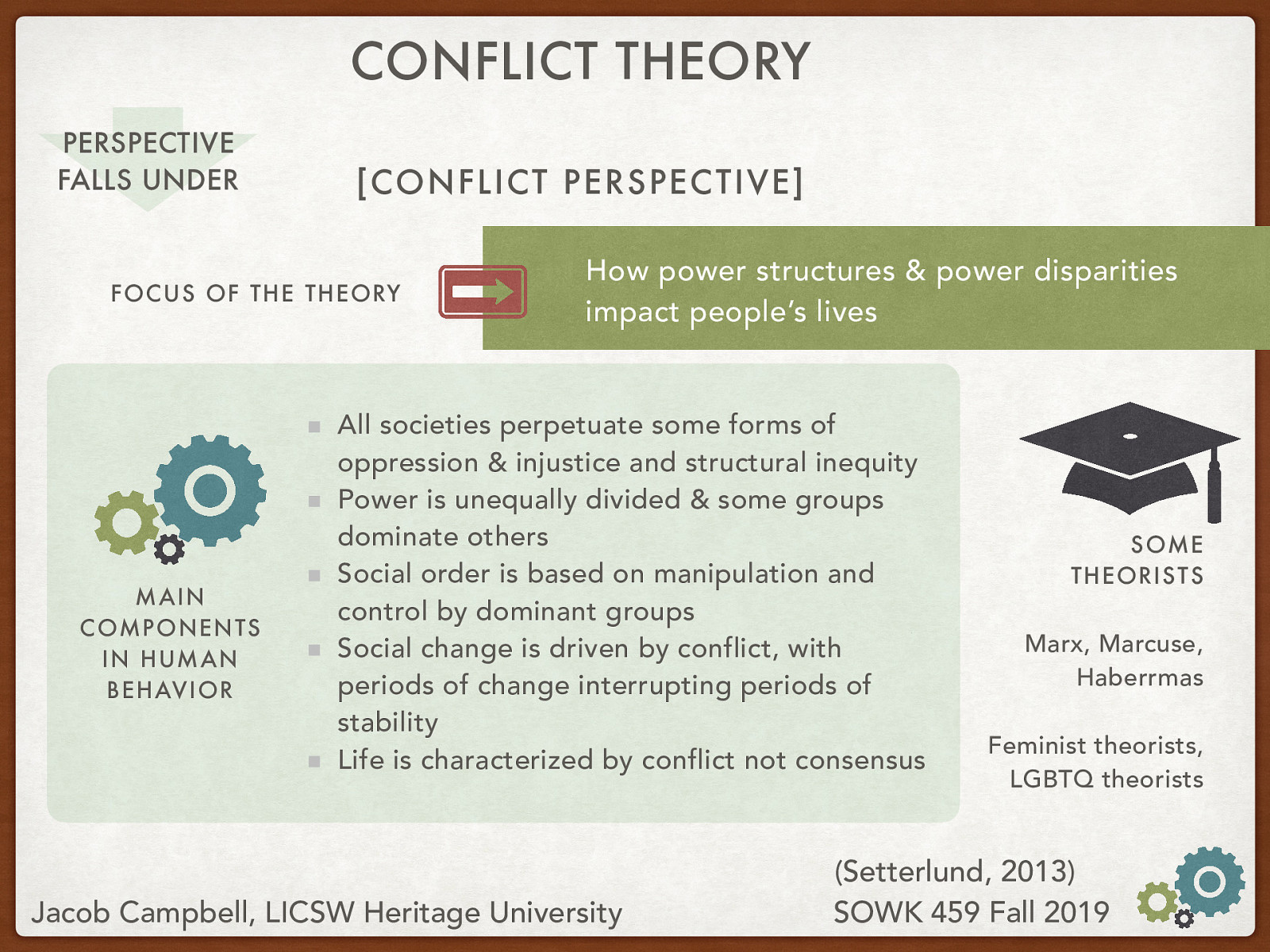
Conflict Theory (1 of 2)
Theory Name: Conflict Theory Underlying Perspective: [Conflict Perspective] Focus of the Theory: How power structures & power disparities impact people’s lives Main Components in Human Behavior:
- All societies perpetuate some forms of oppression & injustice and structural inequity
- Power is unequally divided & some groups dominate others
- Social order is based on manipulation and control by dominant groups
- Social change is driven by conflict, with periods of change interrupting periods of stability
- Life is characterized by conflict not consensus
Theorists: Marx, Marcuse, Haberrmas, Feminist theorists, LGBTQ theorists
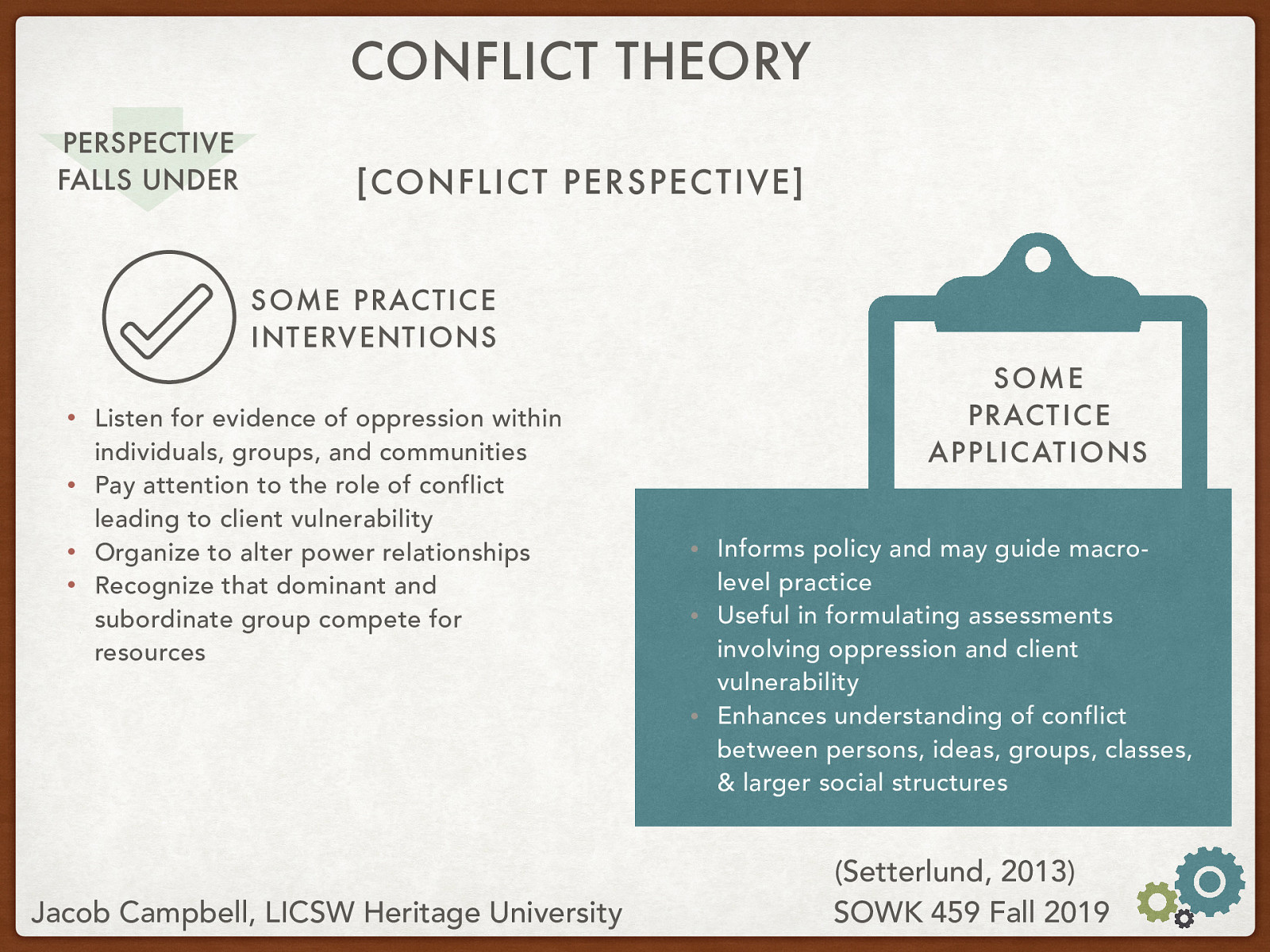
Conflict Theory (2 of 2)
Practice Interventions:
- Listen for evidence of oppression within individuals, groups, and communities
- Pay attention to the role of conflict leading to client vulnerability
- Organize to alter power relationships
- Recognize that dominant and subordinate group compete for resources
Practice Applications:
- Informs policy and may guide macro-level practice
- Useful in formulating assessments involving oppression and client vulnerability
- Enhances understanding of conflict between persons, ideas, groups, classes, & larger social structures
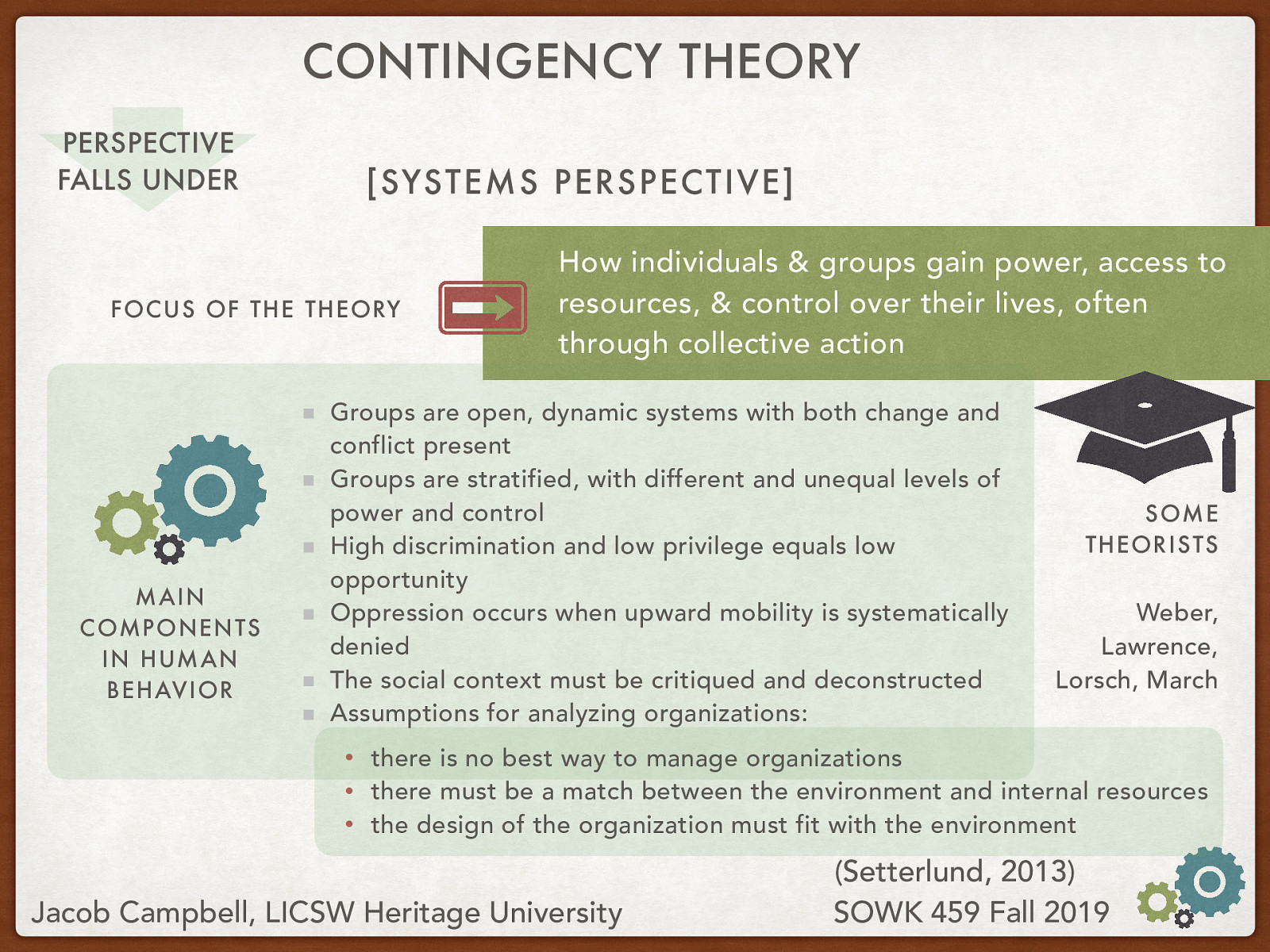
Contingency Theory (1 of 2)
Theory Name: Contingency Theory Underlying Perspective: [Systems Perspective] Focus of the Theory: How individuals & groups gain power, access to resources, & control over their lives, often through collective action Main Components in Human Behavior:
- Groups are open, dynamic systems with both change and conflict present
- Groups are stratified, with different and unequal levels of power and control
- High discrimination and low privilege equals low opportunity
- Oppression occurs when upward mobility is systematically denied
- The social context must be critiqued and deconstructed
- Assumptions for analyzing organizations:
- there is no best way to manage organizations
- there must be a match between the environment and internal resources
- the design of the organization must fit with the environment
Theorists: Weber, Lawrence, Lorsch, March
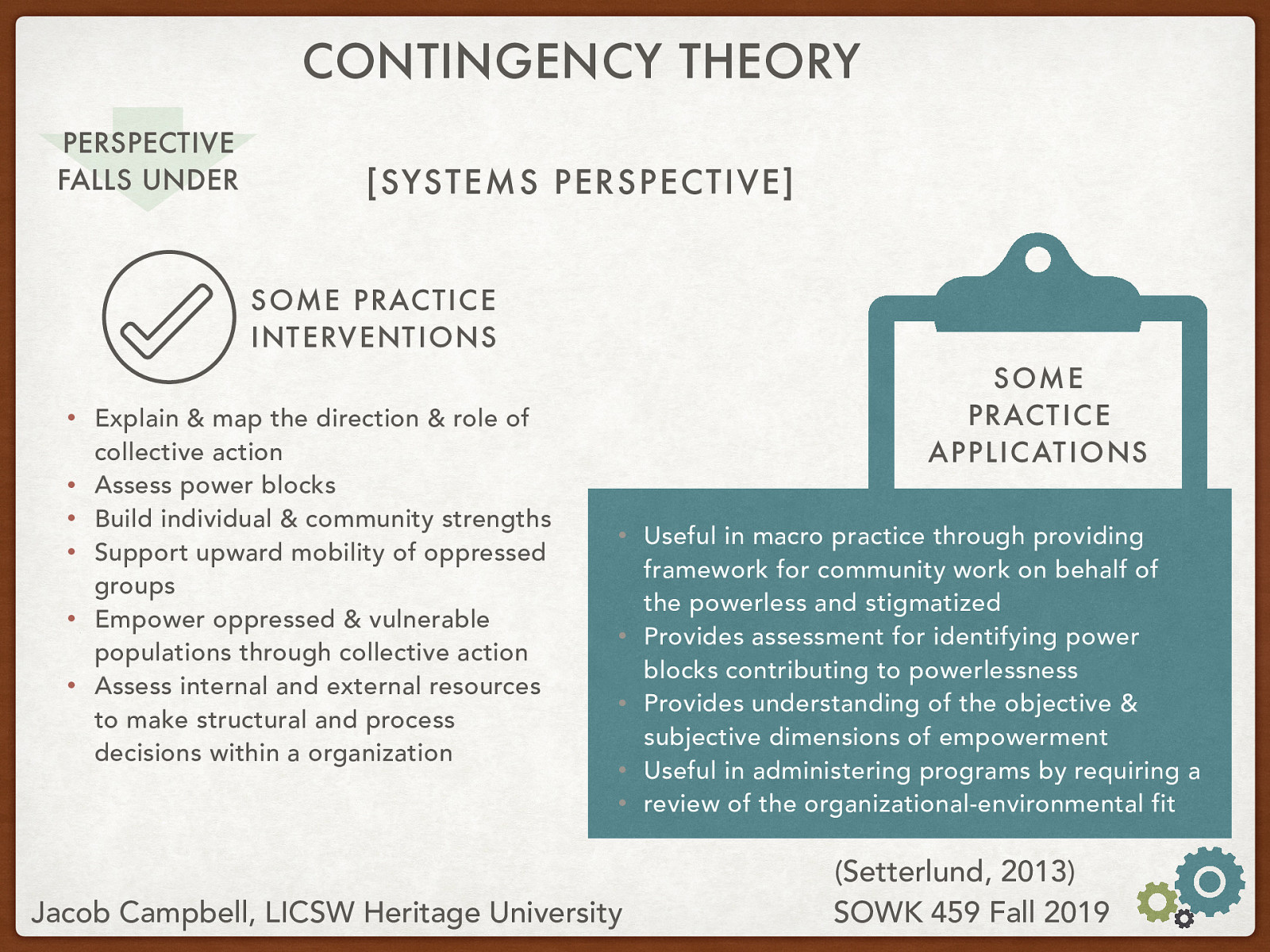
Contingency Theory (2 of 2)
Practice Interventions:
- Explain & map the direction & role of collective action
- Assess power blocks
- Build individual & community strengths
- Support upward mobility of oppressed groups
- Empower oppressed & vulnerable populations through collective action
- Assess internal and external resources to make structural and process decisions within a organization
Practice Applications:
- Useful in macro practice through providing framework for community work on behalf of the powerless and stigmatized
- Provides assessment for identifying power blocks contributing to powerlessness
- Provides understanding of the objective & subjective dimensions of empowerment
- Useful in administering programs by requiring a
- review of the organizational-environmental fit
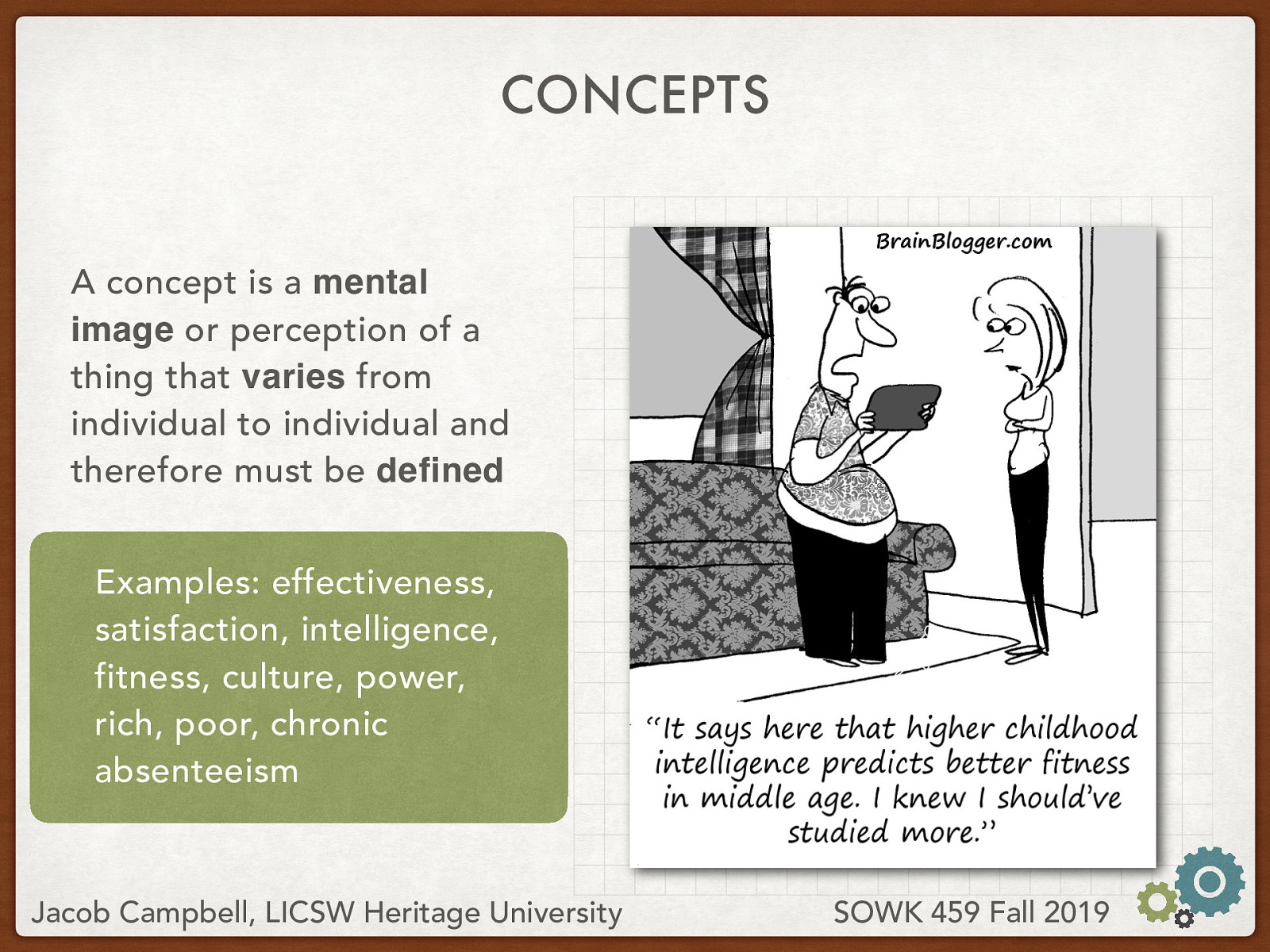
Concepts
Along with paradigms, theories, there are also concepts that you will find.
A concept is a mental image or perception of a thing that varies from individual to individual and therefore must be defined
Examples: effectiveness, satisfaction, intelligence, fitness, culture, power, rich, poor, chronic absenteeism
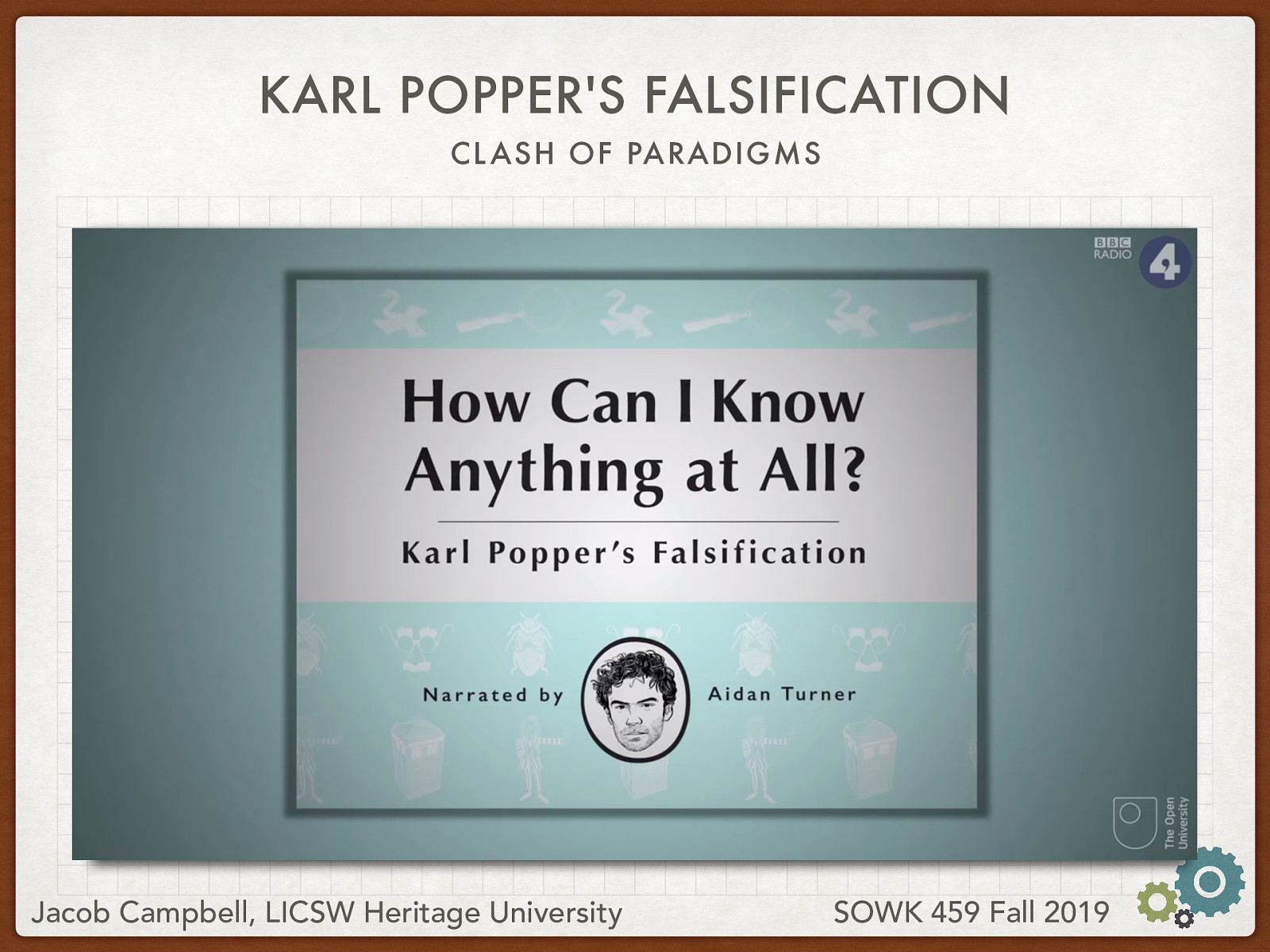
Karl Popper's Falsification: Clash of Paradigms
With all of these paradigms and theories they come into conflict with each other. A helpful way of watching and considering this is through Karl Poppers theory of falsification.
[Whole Class Activity] Watch the video
[Whole Class Activity - Discuss] How these theories conflict. How this can become confusing quickly… etc.
BBC Radio 4 (2015 August 8) Karl popper’s falsification. Retreived from https://youtu.be/wf-sGqBsWv4
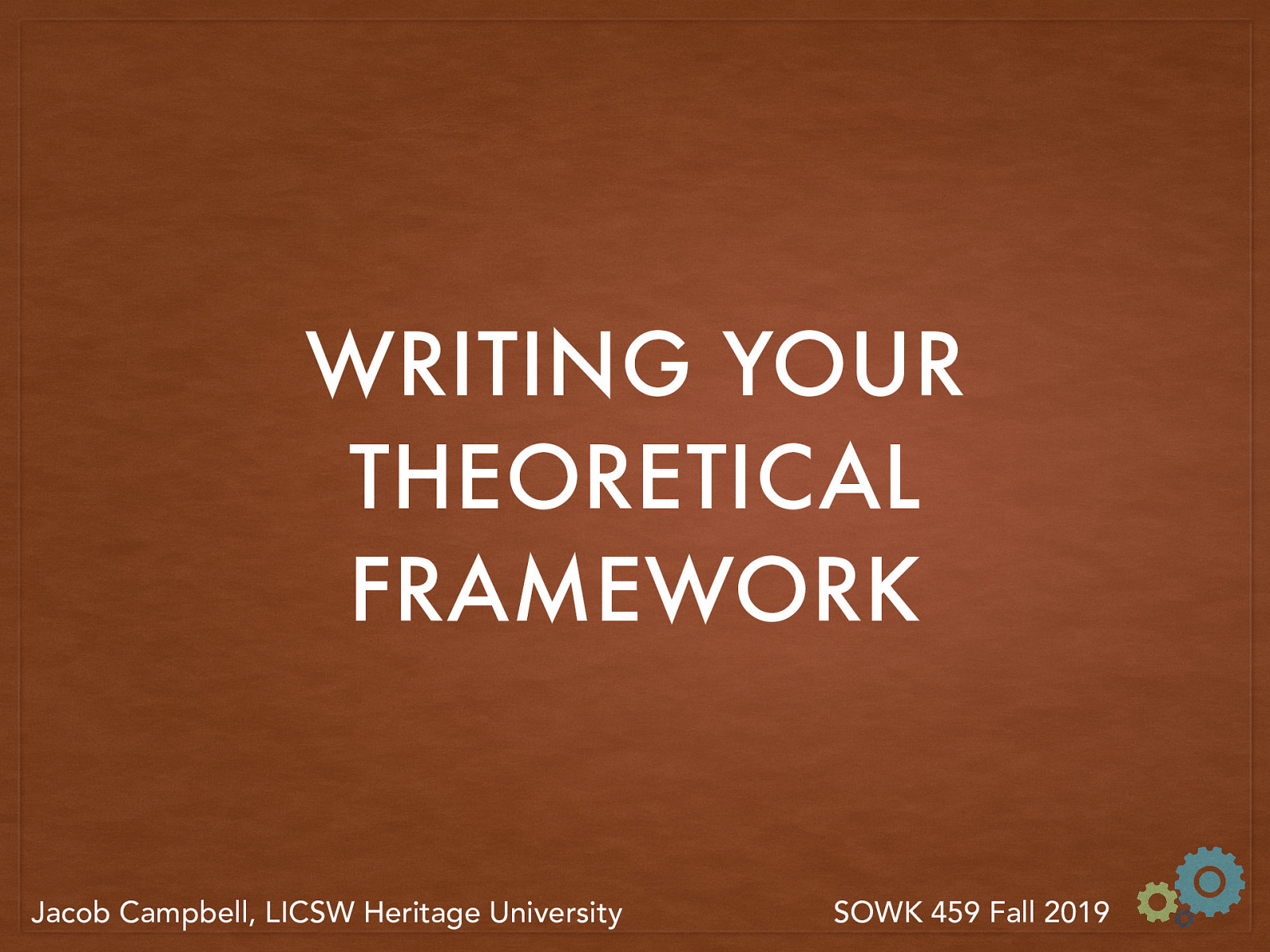
Writing Your Theoretical Framework
Now lets spend some time looking at your writing and how to write about a theoretical framework.
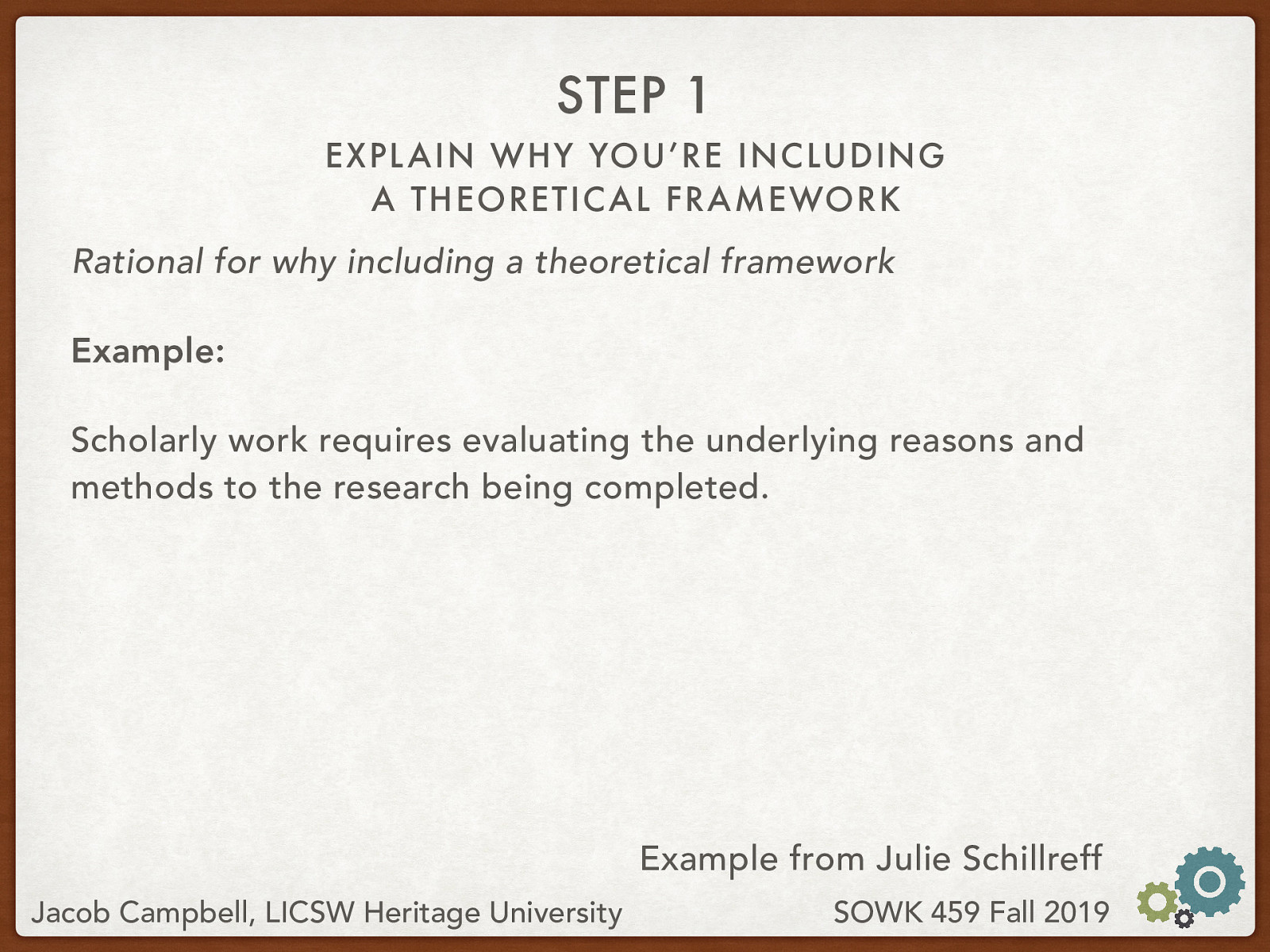
Step 1: Explain why you’re including a theoretical framework
Rational for why including a theoretical framework
Example:
Scholarly work requires evaluating the underlying reasons and methods to the research being completed.
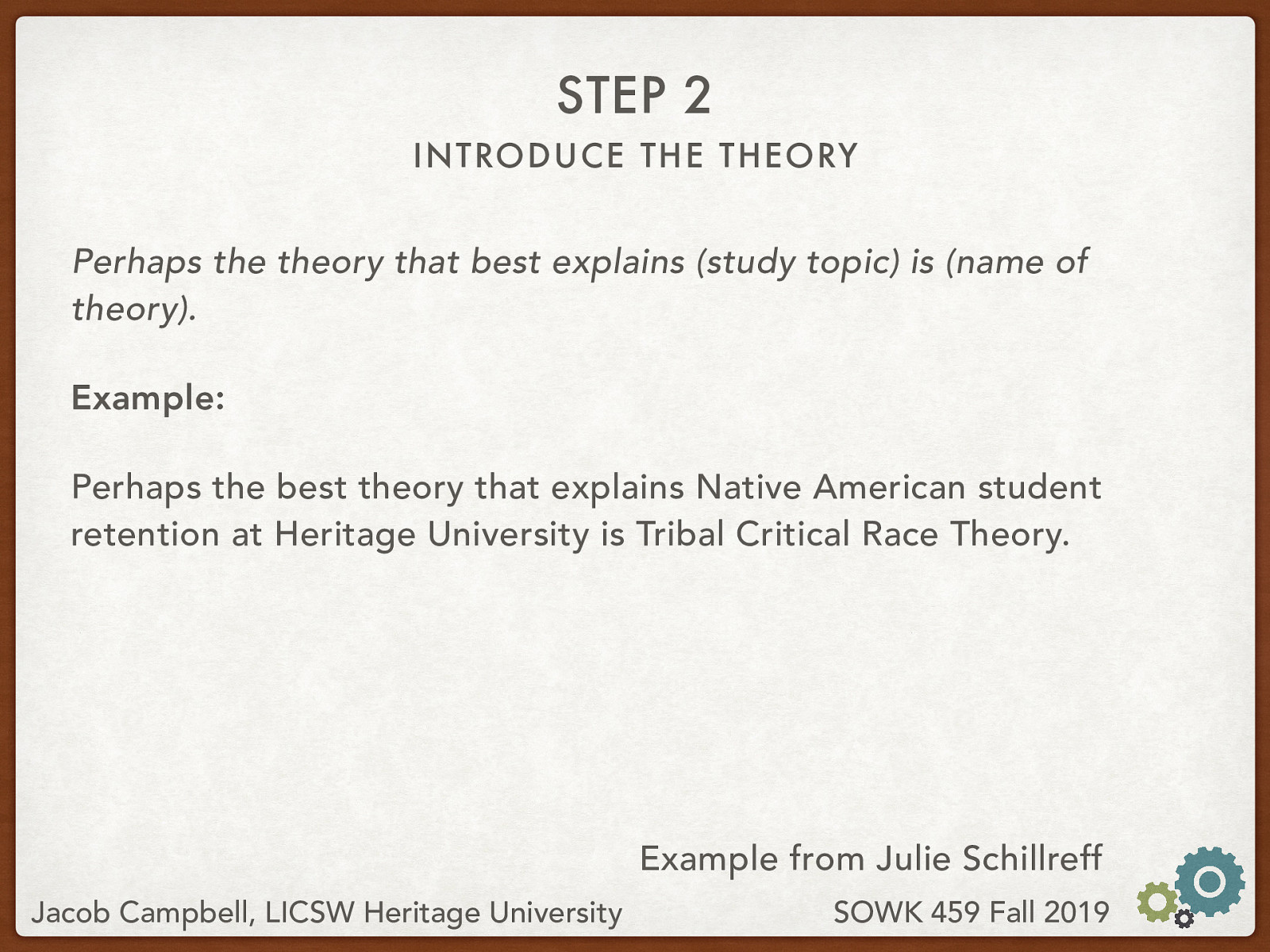
Step 2: Introduce the theory
Perhaps the theory that best explains (study topic) is (name of theory).
Example:
Perhaps the best theory that explains Native American student retention at Heritage University is Tribal Critical Race Theory.
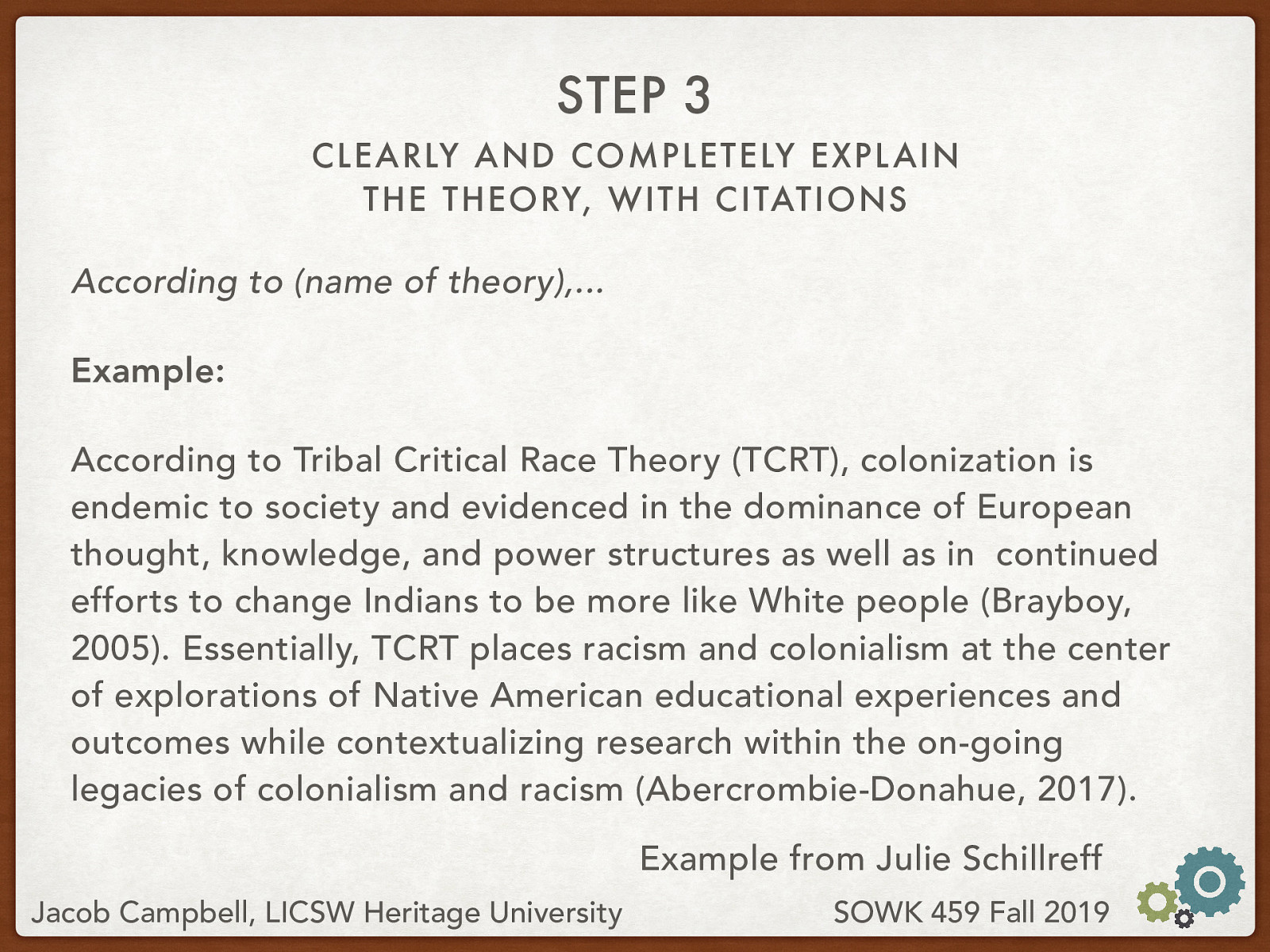
Step 3: Clearly and Completely Explain the theory, with Citations
According to (name of theory),…
Example:
According to Tribal Critical Race Theory (TCRT), colonization is endemic to society and evidenced in the dominance of European thought, knowledge, and power structures as well as in continued efforts to change Indians to be more like White people (Brayboy, 2005). Essentially, TCRT places racism and colonialism at the center of explorations of Native American educational experiences and outcomes while contextualizing research within the on-going legacies of colonialism and racism (Abercrombie-Donahue, 2017).

Searching Online Demo: Google Scholar, Eagle Search
- Show examples of searching online
- Set up Google Scholar with Heritage
- Using the Eagle Search
- Using the advanced search options
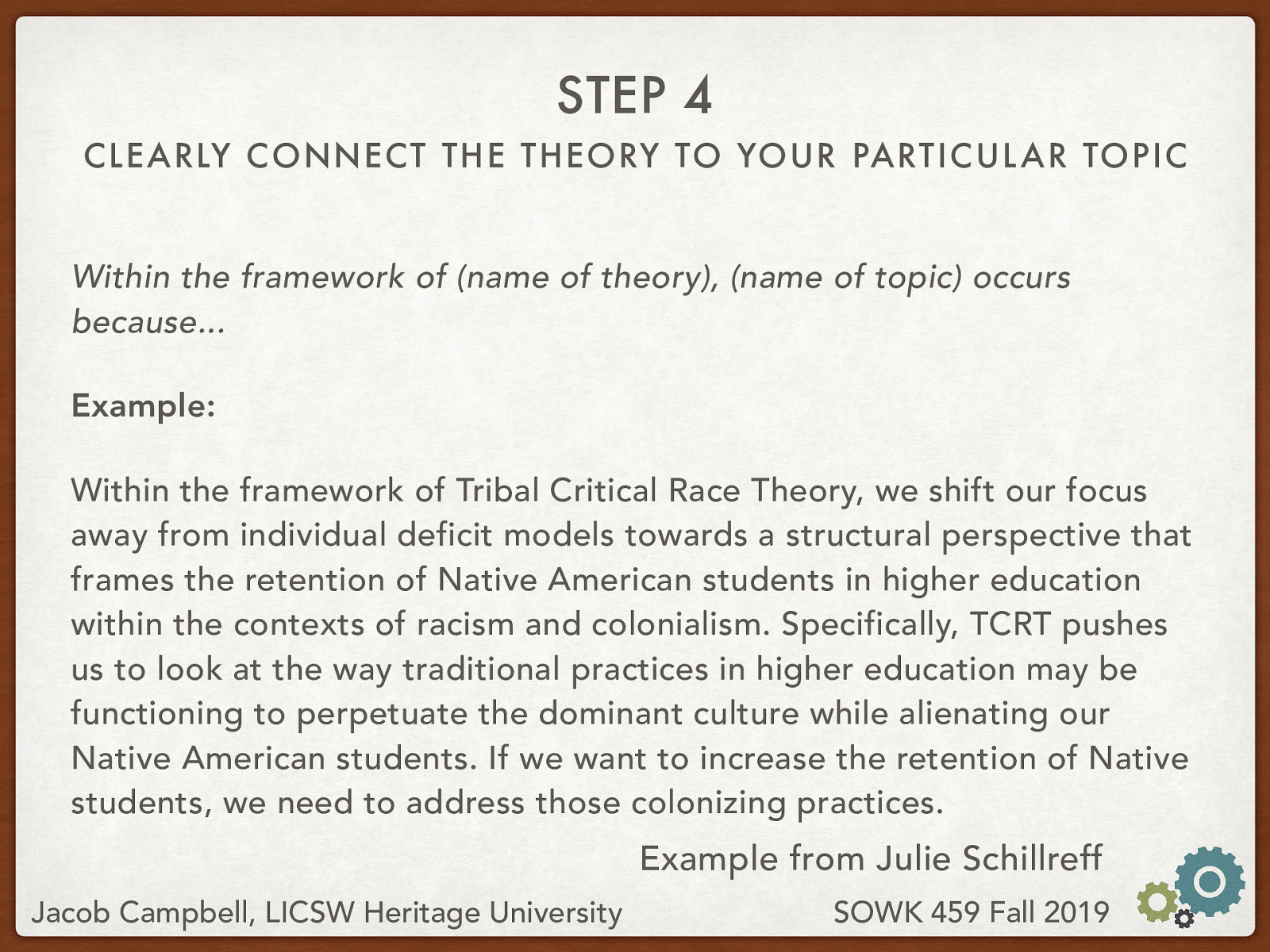
Step 4: Clearly Connect The Theory to Your Particular topic
Within the framework of (name of theory), (name of topic) occurs because…
Example:
Within the framework of Tribal Critical Race Theory, we shift our focus away from individual deficit models towards a structural perspective that frames the retention of Native American students in higher education within the contexts of racism and colonialism. Specifically, TCRT pushes us to look at the way traditional practices in higher education may be functioning to perpetuate the dominant culture while alienating our Native American students. If we want to increase the retention of Native students, we need to address those colonizing practices.
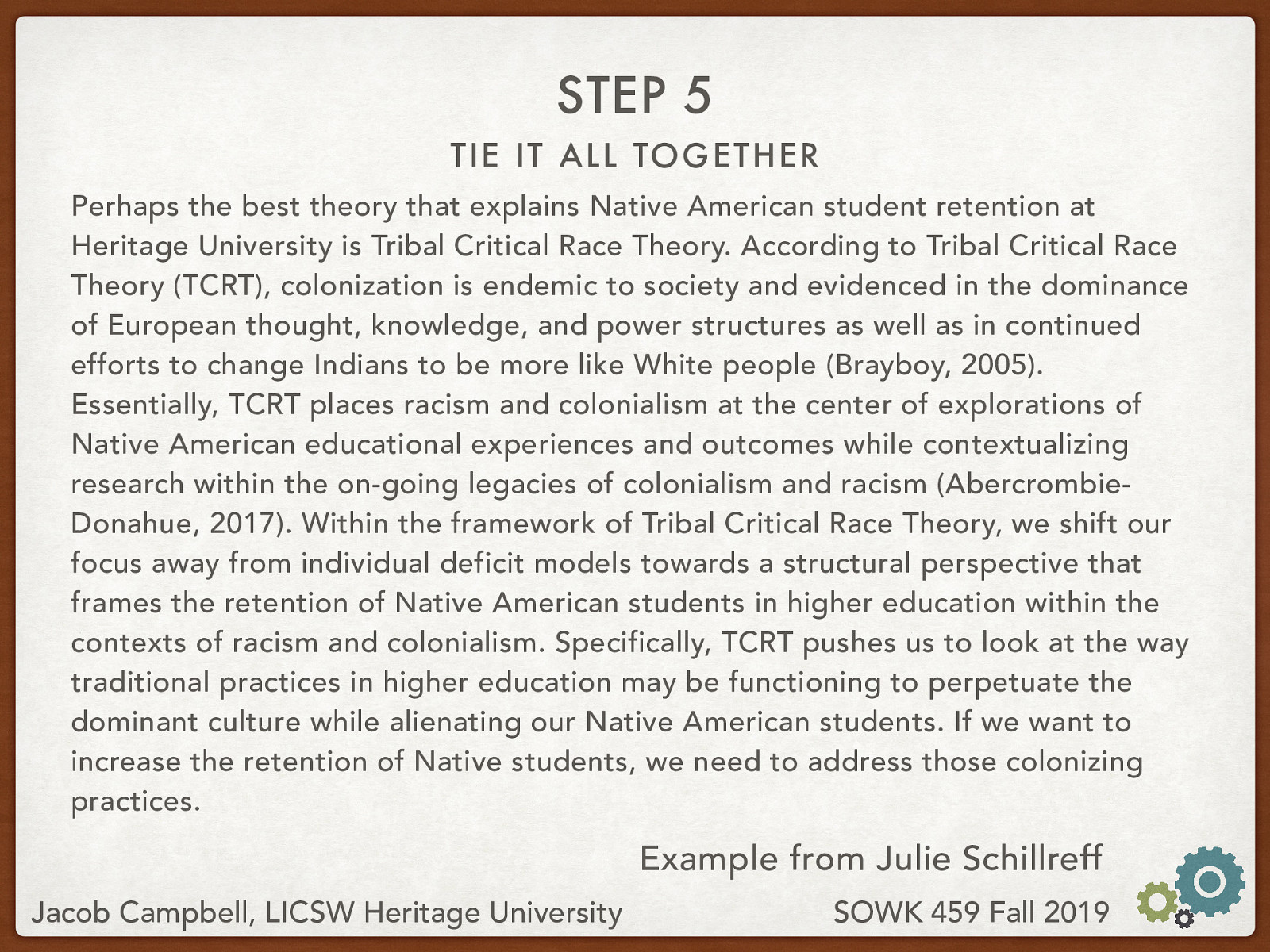
Step 5: Tie it all Together
Perhaps the best theory that explains Native American student retention at Heritage University is Tribal Critical Race Theory. According to Tribal Critical Race Theory (TCRT), colonization is endemic to society and evidenced in the dominance of European thought, knowledge, and power structures as well as in continued efforts to change Indians to be more like White people (Brayboy, 2005). Essentially, TCRT places racism and colonialism at the center of explorations of Native American educational experiences and outcomes while contextualizing research within the on-going legacies of colonialism and racism (Abercrombie-Donahue, 2017). Within the framework of Tribal Critical Race Theory, we shift our focus away from individual deficit models towards a structural perspective that frames the retention of Native American students in higher education within the contexts of racism and colonialism. Specifically, TCRT pushes us to look at the way traditional practices in higher education may be functioning to perpetuate the dominant culture while alienating our Native American students. If we want to increase the retention of Native students, we need to address those colonizing practices.
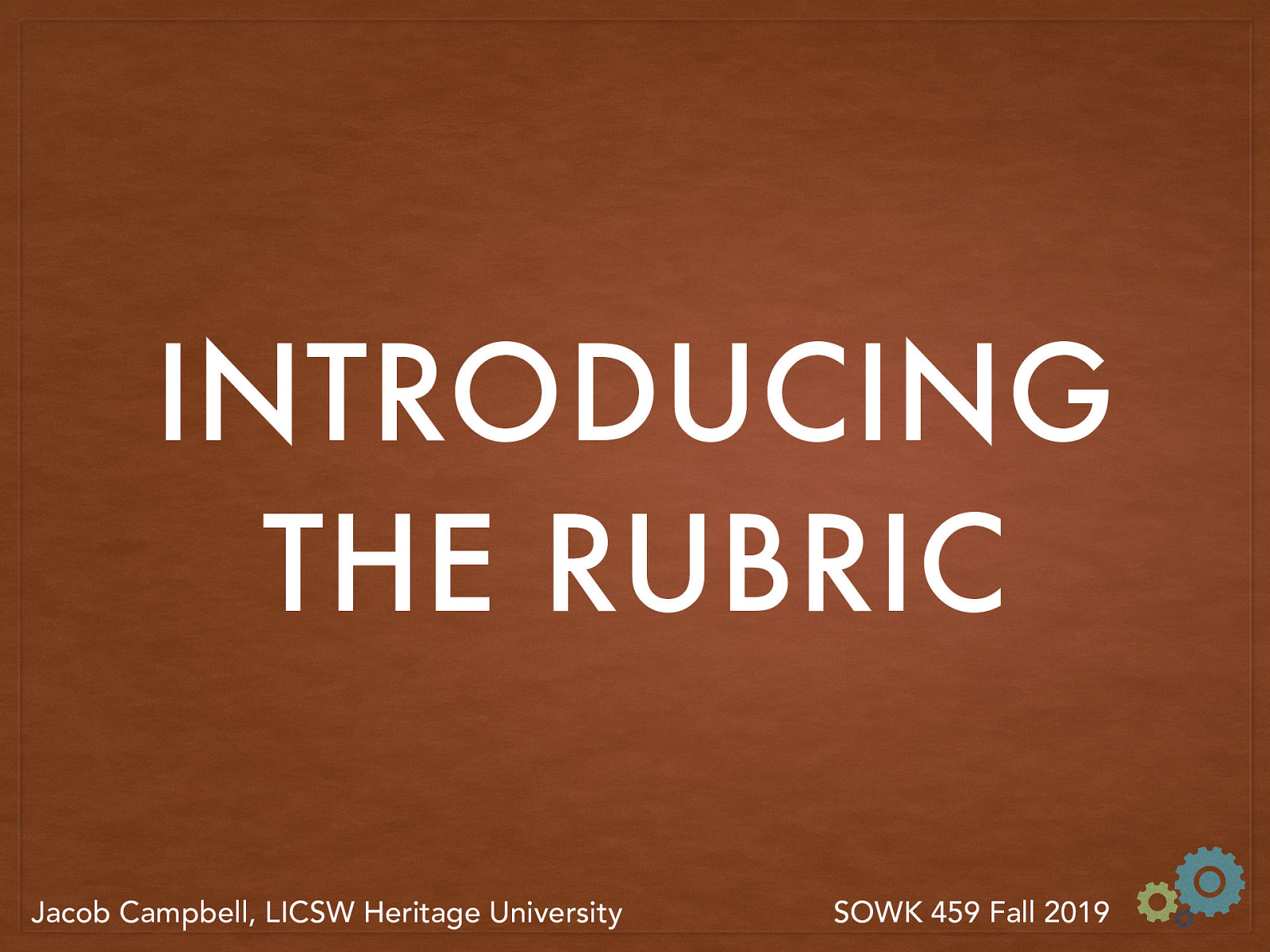
Introducing the Rubric
The next thing we want to do is go over the rubric for theoretical frameworks
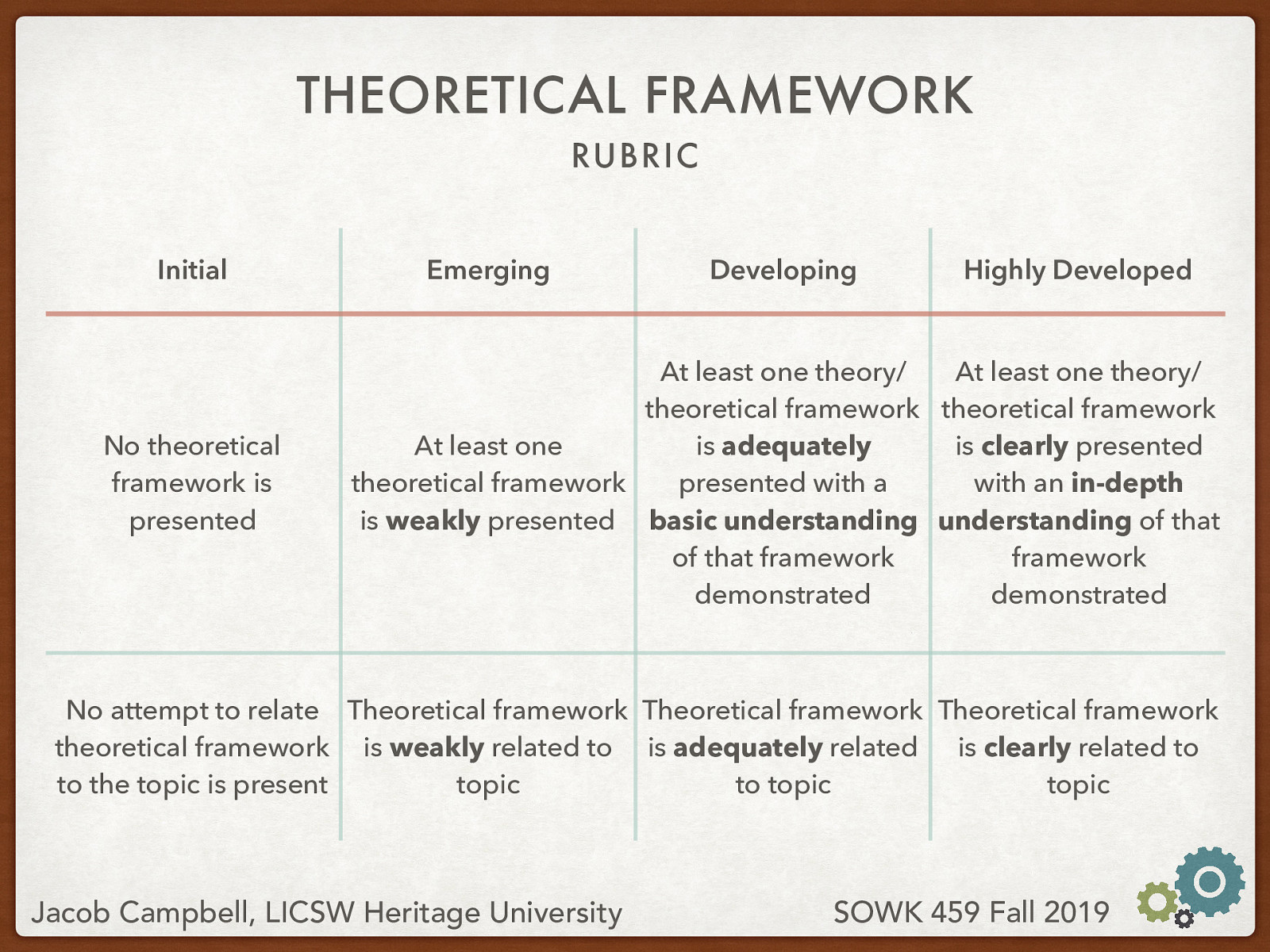
Theoretical Framework: Rubric
The following is the rubric that is in the syllabus
Initial | Emerging | Developing | Highly Developed —- | —- | —- | —- No theoretical framework is presented | At least one theoretical framework is weakly presented | At least one theory/theoretical framework is adequately presented with a basic understanding of that framework demonstrated | At least one theory/theoretical framework is clearly presented with an in-depth understanding of that framework demonstrated No attempt to relate theoretical framework to the topic is present | Theoretical framework is weakly related to topic | Theoretical framework is adequately related to topic | Theoretical framework is clearly related to topic
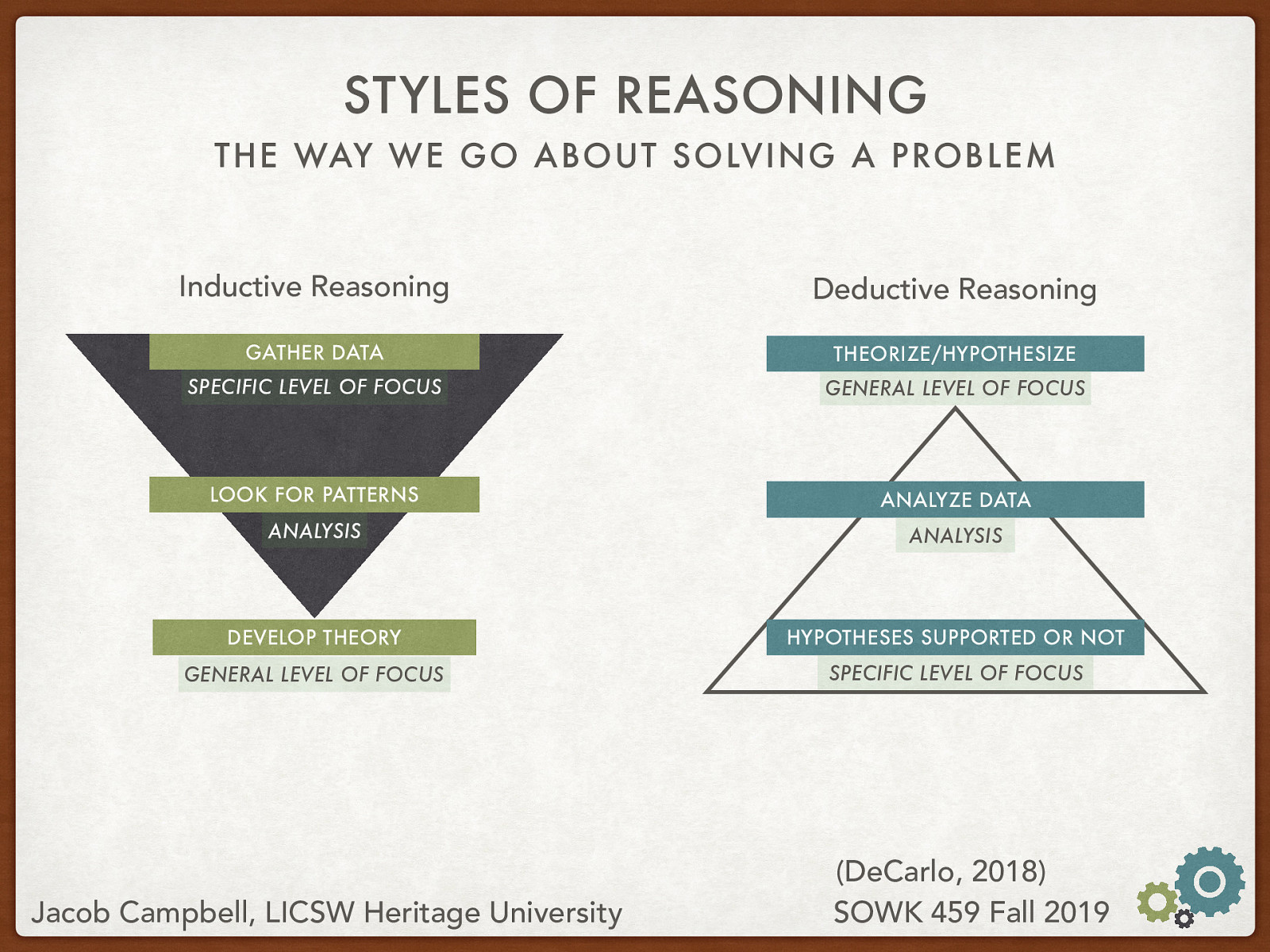
Styles of Reasoning: The Way We Go About Solving a Problem
There are two ways that we go about solving a problem. These are inductive reasoning and deductive reasoning.
Inductive Reasoning: Data to theory
“start with a set of observations and then move from particular experiences to a more general set of propositions about those experiences:
Gather Data (Specific level of focus) -> Look for Patterns (Analysis) -> Develop Theory (General Level of Focus)
Deductive Reasoning: theory to “truth”
“Study what others have done, reads existing theories of whatever phenomenon she is studying, and then tests hypotheses that emerge from those theories”
Theorize/Hypothesize (general level of focus) -> Analyze Data (Analysis) -> Hypotheses Supported or Not (Specific Level of Focus)
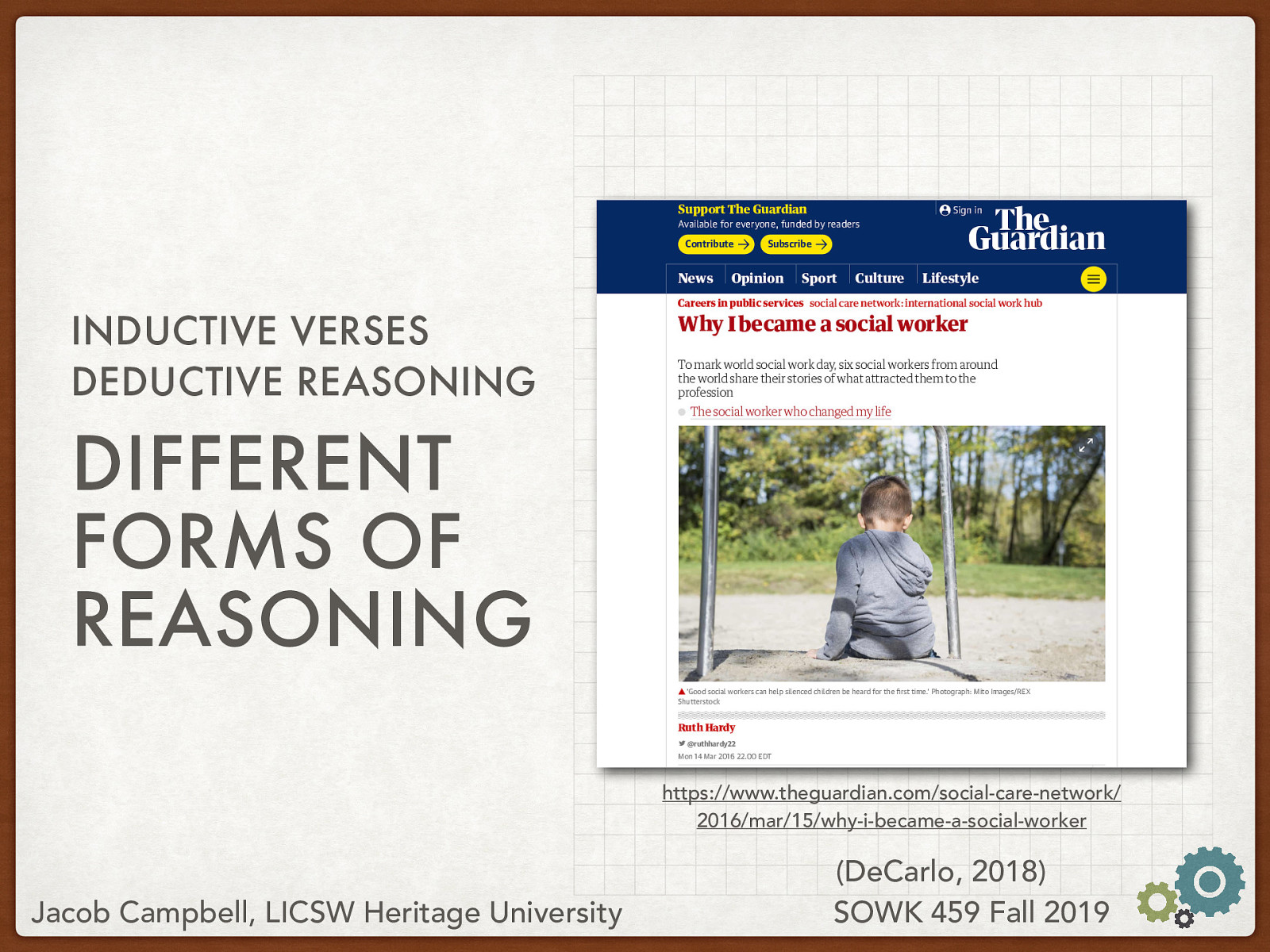
Different Forms of Reasoning: Inductive Verses Deductive Reasoning
To help us look into and understand these forms of reasoning, lets dive into some data published by the Guardian by Hardy (2016)
[Whole Class Activity] Open the webpage, show that it talks about some stories of social workers and why they became social works.
[Small Group Activity] Have students break up into small groups and talk about how they would approach the question of how do social workers from an inductive and a deductive approach
Hardy, R. (2016 March 14) Why I became a social worker. Retrieved from https://www.theguardian.com/social-care-network/2016/mar/15/why-i-became-a-social-worker.
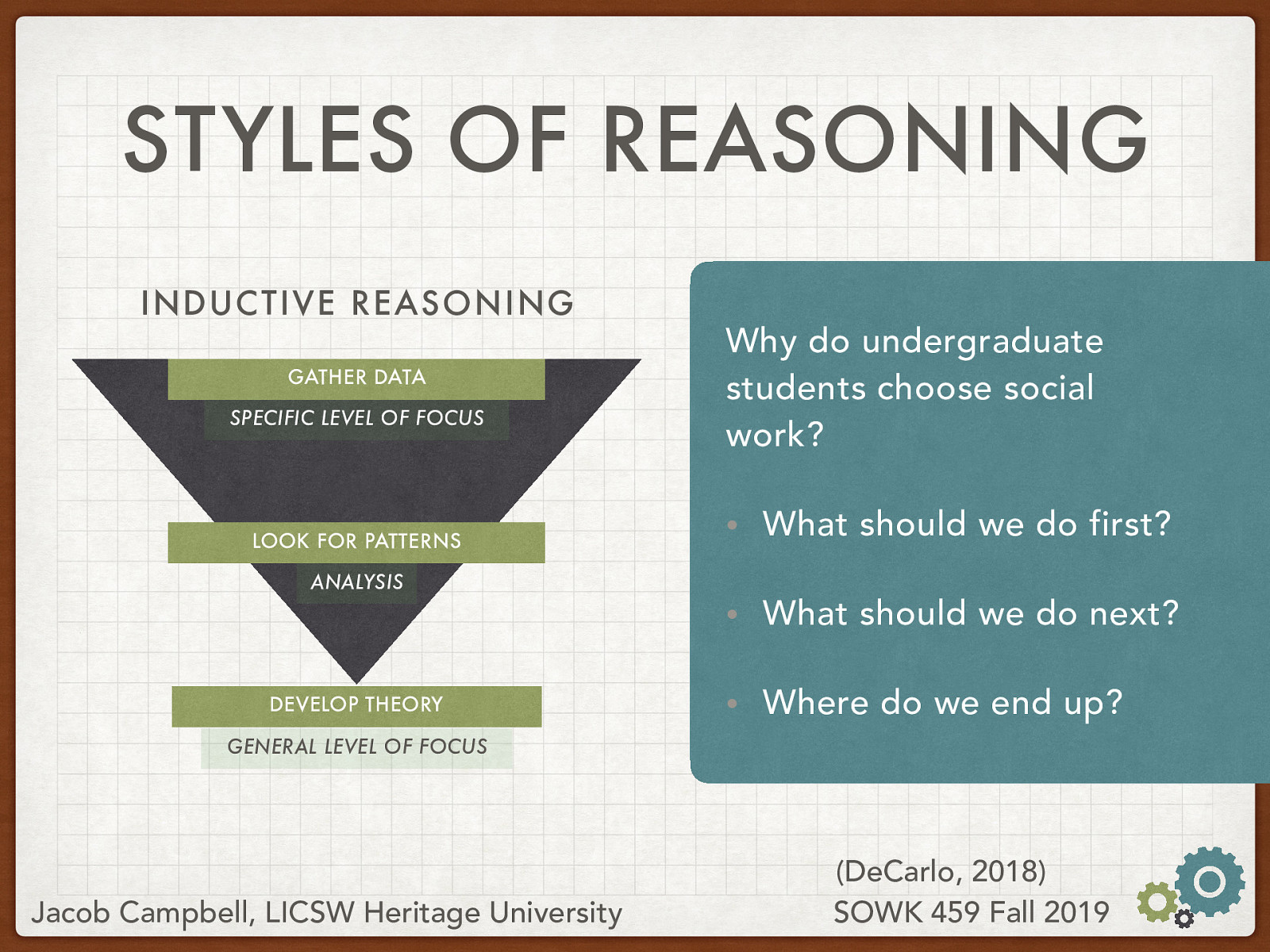
Styles of Reasoning: Inductive
[Whole Class Activity - Discussion] Take the class through what they might think about for inductive reasoning.
Why do undergraduate students choose social work?
- What should we do first?
- What should we do next?
- Where do we end up?
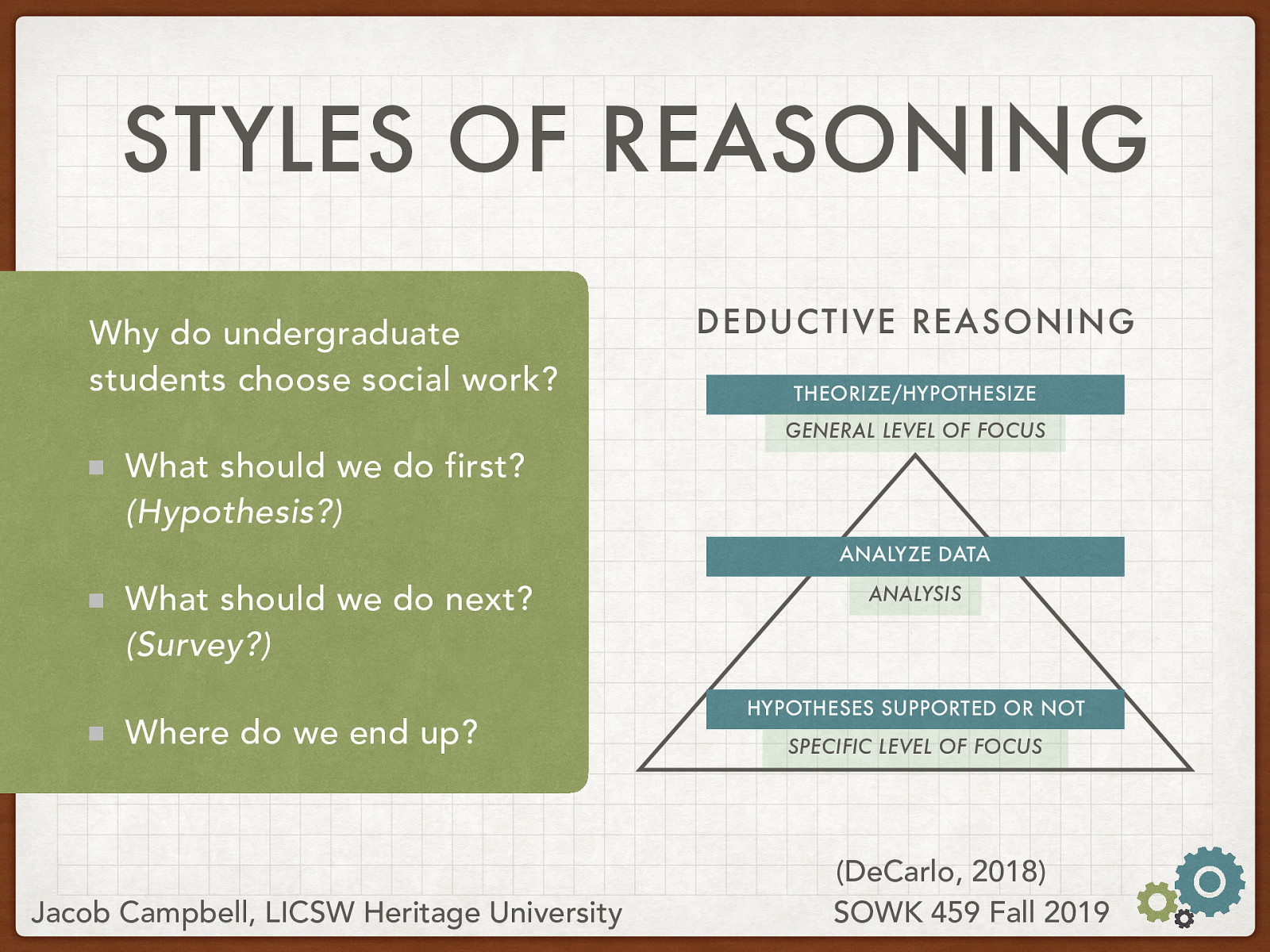
Styles of Reasoning: Deductive
[Whole Class Activity - Discussion] Take the class through what they might think about for deductive reasoning.
Why do undergraduate students choose social work?
- What should we do first?(Hypothesis?)
- What should we do next?(Survey?)
- Where do we end up?
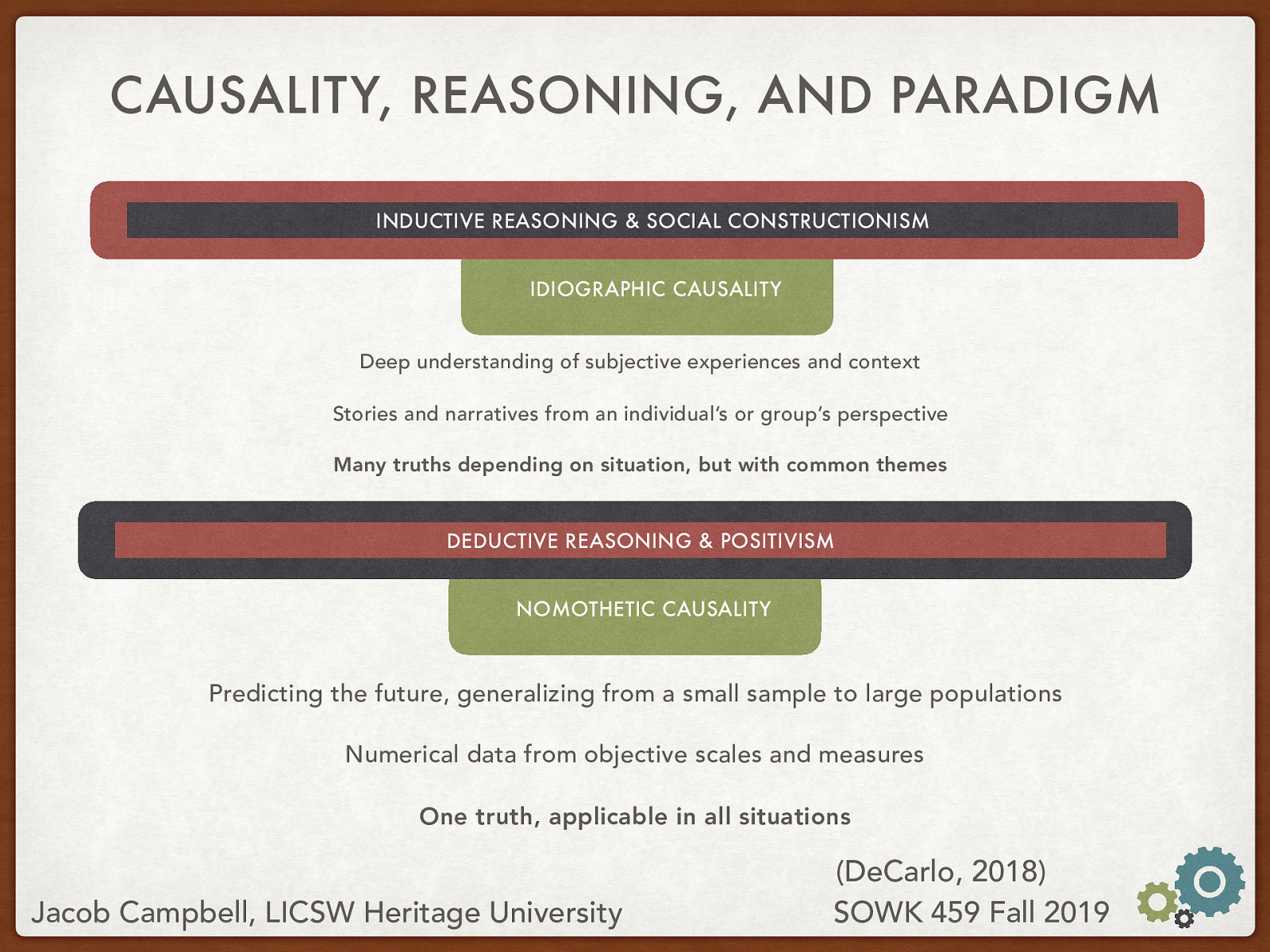
Causality, Reasoning, and Paradigm
Causality is something that is difficult to prove. How it does get proven or demonstrated is based on both the reasoning and the paradigm. To help example this there is idiographic causality and nomothetic causality
Inductive Reasoning & Social Constructionism Idiographic causality:
- Deep understanding of subjective experiences and context
- Stories and narratives from an individual’s or group’s perspective
- Many truths depending on situation, but with common themes
Deductive Reasoning & Positivism Nomothetic causality:
- Predicting the future, generalizing from a small sample to large populations
- Numerical data from objective scales and measures
- One truth, applicable in all situations
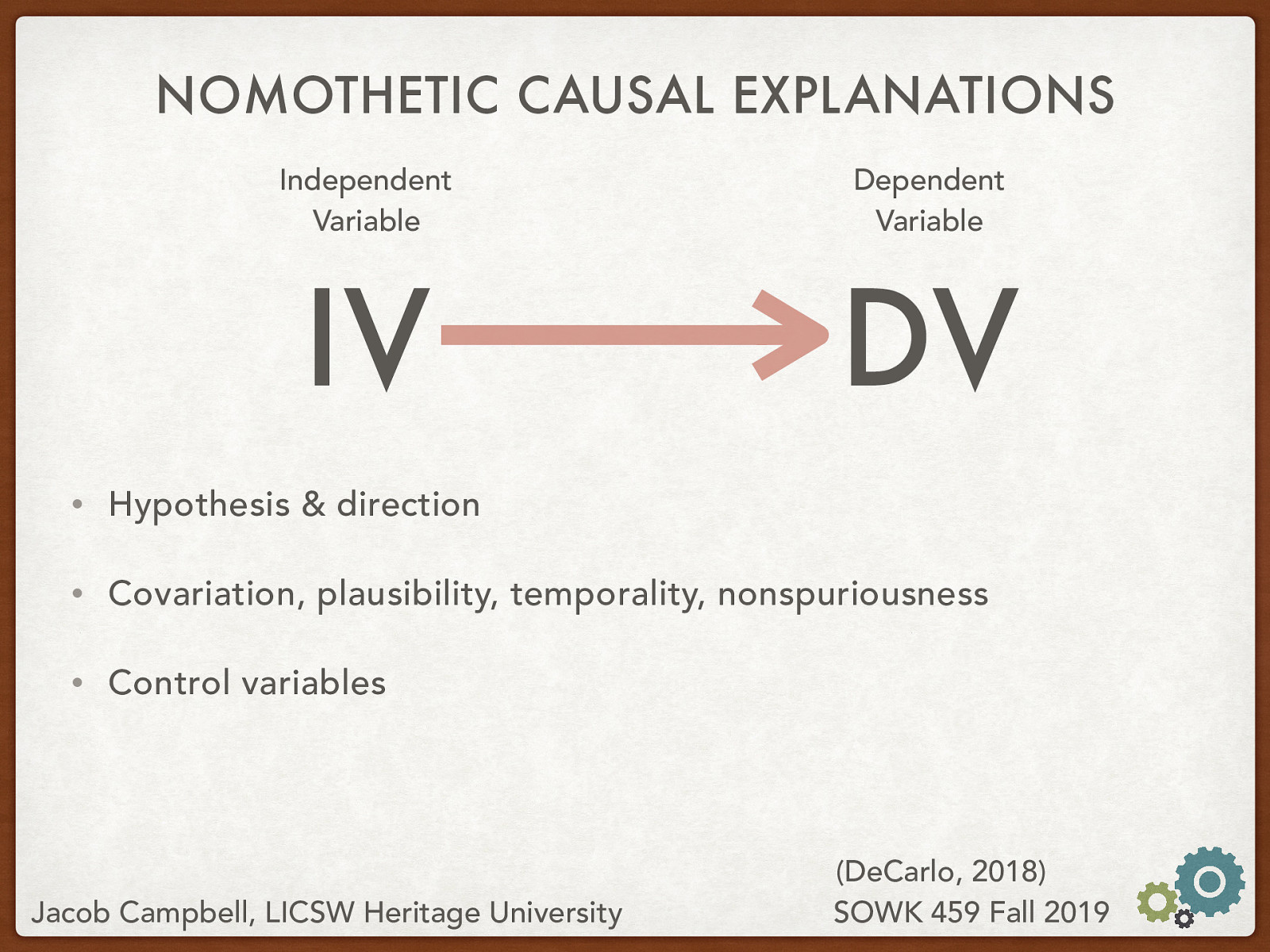
Nomothetic Causal Explanations
Nomothetic causal explanations require a type of math to be proven. They use variables and look for changes in those variables. Basically:
IV (Independent Variable) changes the DV (Dependent Variable).
Independent Variable: The thing that is being manipulated or observed Dependent Variable: The thing that is changed based on the manipulation or observation
The hypothesis describes the relationship of the these variables and what we think is going to have happen.
To be able to be causal… must…
Covariation: “the degree to which two variables vary together” Plausibility: in order to make the claim that one event, behavior, or belief causes another, the claim has to make sense Temporality: “whatever cause you identify must happen before the effect” Nonspuriousness: Spurious- “an association between two variables appears to be causal but can in fact be explained by some third variable”
Control Variables: “potential ‘third variables’ effects are controlled for mathematically in the data analysis process to highlight the relationship between the independent and dependent variable”
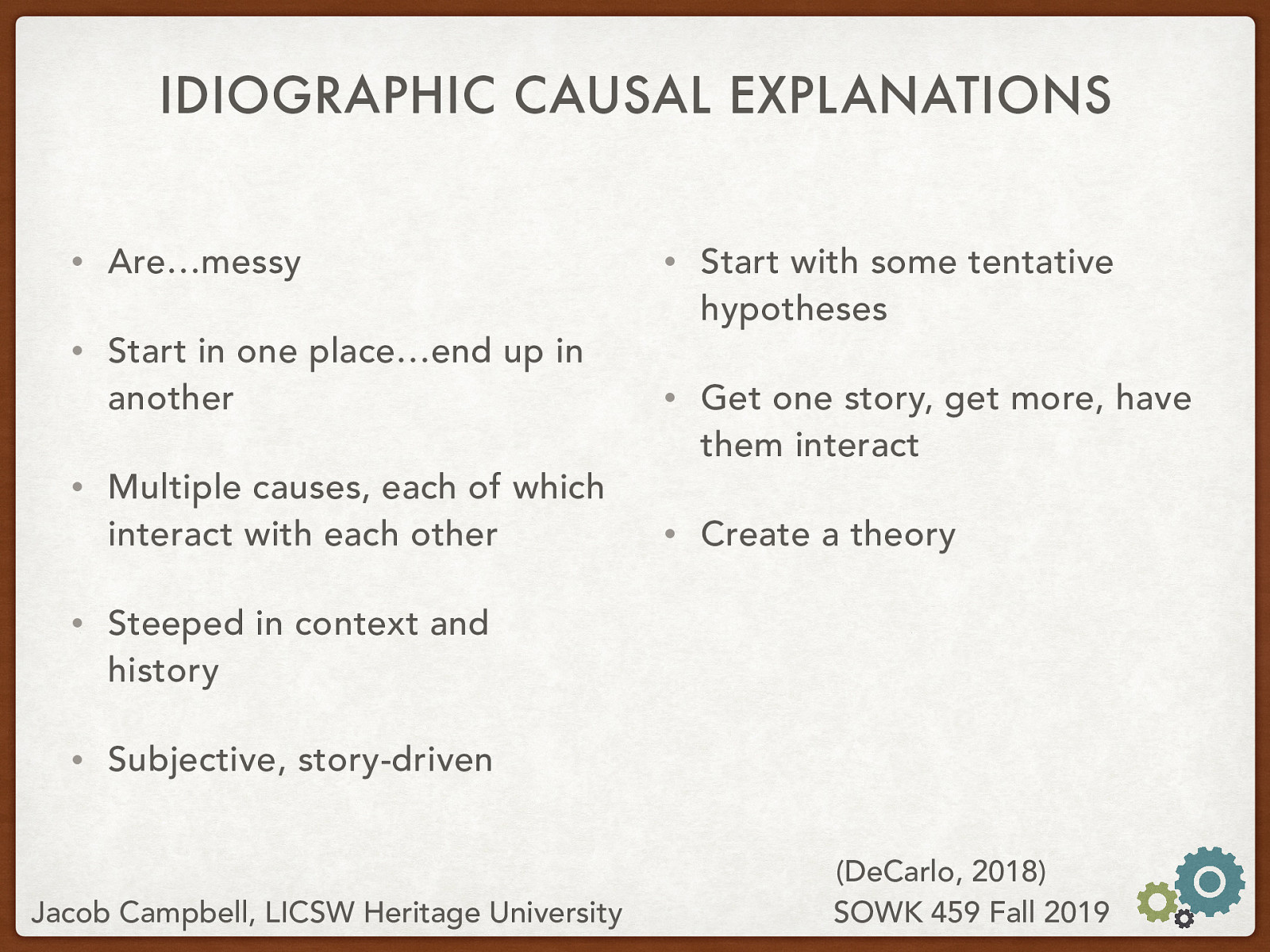
Idiographic Causal Explanations
Idiographic causal explanations are… messy
- Are…messy
- Start in one place…end up in another
- Multiple causes, each of which interact with each other
- Steeped in context and history
- Subjective, story-driven
- Start with some tentative hypotheses
- Get one story, get more, have them interact
- Create a theory
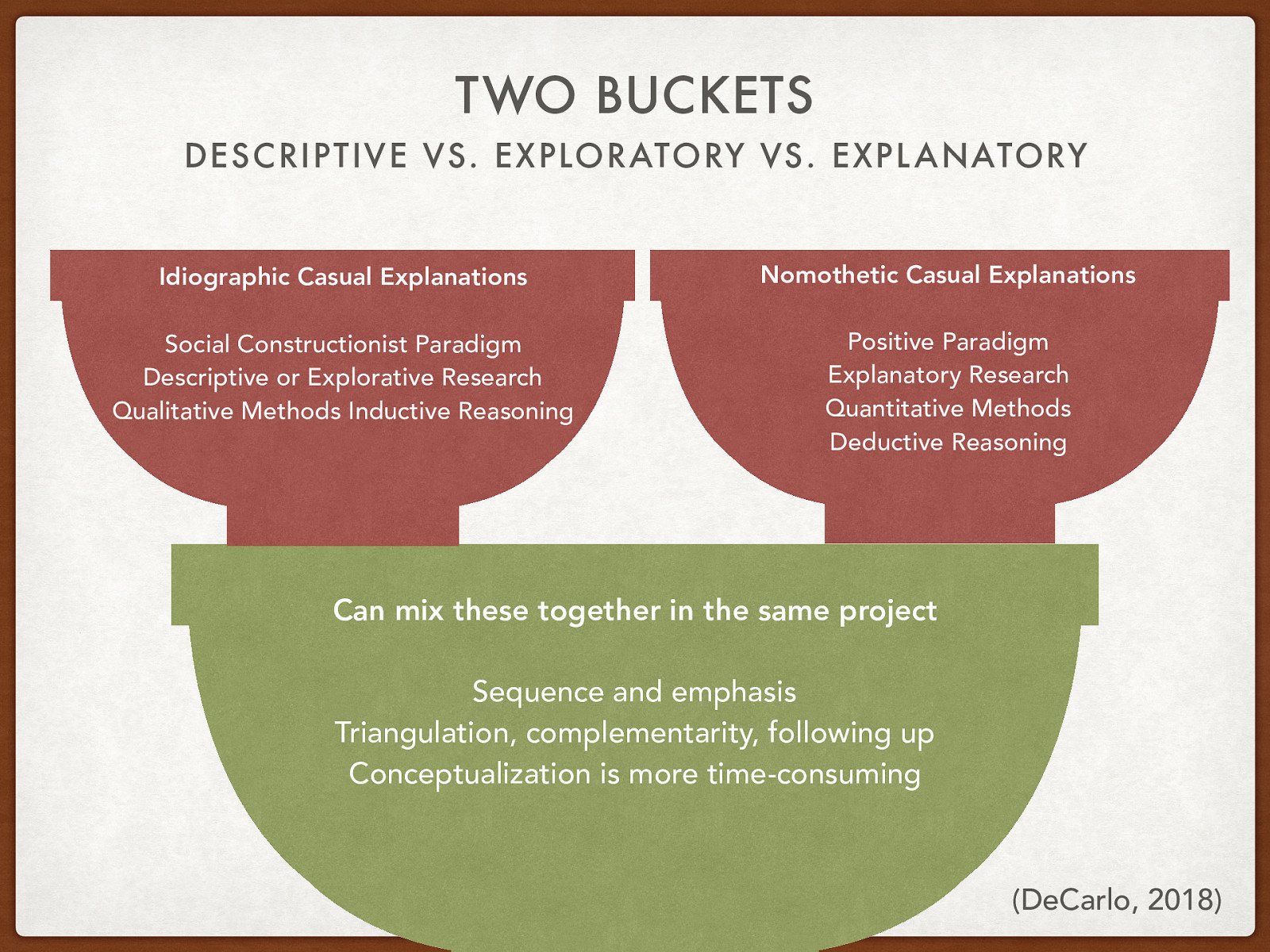
Two Buckets: Descriptive vs. Exploratory vs. Explanatory
Idiographic Casual Explanations
- Social Constructionist Paradigm
- Descriptive or Explorative Research
- Qualitative Methods Inductive Reasoning
Nomothetic Casual Explanations
- Positive Paradigm
- Explanatory Research
- Quantitative Methods
- Deductive Reasoning
Can mix these together in the same project
- Sequence and emphasis
- Triangulation, complementarity, following up
- Conceptualization is more time-consuming
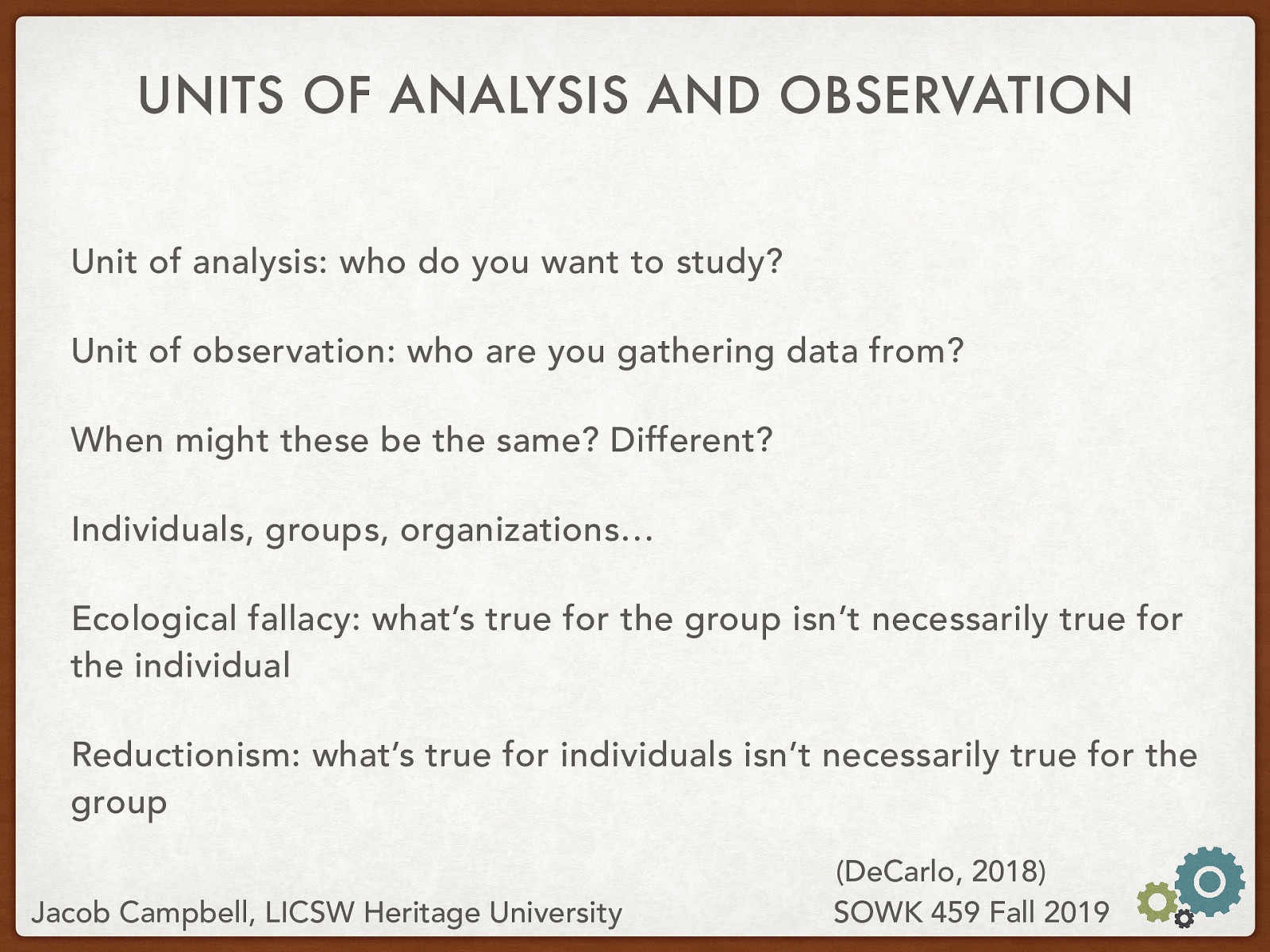
Units of Analysis and Observation
- Unit of analysis: who do you want to study?
- Unit of observation: who are you gathering data from?
- When might these be the same? Different?
- Individuals, groups, organizations…
- Ecological fallacy: what’s true for the group isn’t necessarily true for the individual
- Reductionism: what’s true for individuals isn’t necessarily true for the group
A dive into theoretical frameworks as they relate to social science research methods. The agenda is as follows:
- Perspectives and theories
- Writing your theoretical framework
- Styles of reasoning for research
